14 Tips for an Effective College Visit
Visiting a college can help a student determine if he or she wants to spend the next four years there.

Getty Images |

Finding the right fit.
For high school students in the process of researching a variety of colleges and universities , admissions professionals recommend scheduling campus visits to get a better feel for the schools. Some colleges track whether prospective students make an in-person visit and count it as "demonstrated interest," which could help admissions chances. For both students and families, campus visits are an important part of the process when choosing which college to attend. "They are very likely to show you things that you didn’t know you cared about. That’s a great first step," says Rachel Rubin, co-founder of admissions consulting company Spark Admissions. "It’s really important for families to think about what they want to know.” Here are 14 tips for how students can get the most out of college visits.

(Getty Images) |
- Start planning early.
As students get closer to the final year of high school, their schedules are filled trying to balance school and a social life – all while exploring potential college campuses. To ease the stress, students and families may want to make visits sooner, ideally before senior year. The College Board recommends spring of junior year as a good time to visit campuses for students who have already done the research on those colleges. College visits are a good use of downtime over spring break, as well. Late summer and early fall before senior year are also convenient times, the College Board website notes, adding that classes may already be in session, allowing prospective students a fuller glimpse of campus life.

- Ask questions.
A campus visit is a great chance to not only see the campus, but also to ask questions about the school and what the experience is like on campus. While some information can be found on a school's website, speaking with student ambassadors or school officials while visiting campus can provide additional important information necessary for making a smart college decision. "I think the best way to make the most of the tours is to ask a lot of good questions of the tour guide and to engage with any current students to get their opinion on life on the campus,” says Satyajit Dattagupta, chief enrollment officer and senior vice chancellor at Northeastern University in Massachusetts.

- Get student perspectives.
The largest population on any college campus is the student body. Given their collective experience, it's likely they'll have opinions to share on academics, facilities, dining services , student life and more. Talking to current students is a valuable part of vetting a college and can provide prospective students with unfiltered perspectives about the school and the student experience. "Talk to as many students as you can to get a flavor of the student population," says Liz Doe Stone, a senior private counselor for Top Tier Admissions, an admissions consulting company. "Email students from your high school who attend that school and ask to get together for coffee when you’re on campus."

- Explore college through the lens of campus media.
Student newspapers can be a valuable source of insight into what's happening at a college. But don't stop there. The College Board's campus visit checklist also recommends tuning in to the campus radio station and reading other campus publications such as literary reviews and department newsletters. This allows students to find out what issues are popular on campus, controversies happening, new programs being created, what students are excited about and trends to be aware of, Stone says. "The more that you can do ahead of time to get to know the campus culture so that you can ask good questions to current students, that’s another great way to get a more authentic sense of what’s going on or what it would be like to be a student there."

- Visit academic departments.
Along with being comfortable with the campus environment, students should explore academic departments that interest them. A great way to start can be touring facilities, sitting in on a class and meeting professors . This is a good way for students to learn about the areas where they might be spending the most time if they choose to attend school there, and it's also valuable information when comparing schools. For best results, email professors or administrators ahead of time to set up a meeting, Stone says, but even informal visits can be valuable.

- Check out other campuses nearby.
When visiting a college in person, prospective students should consider visiting other campuses nearby. Many major metro areas are home to multiple colleges, and even rural areas may have colleges that are surprisingly close together. As students plan their visits, families should take note of other options near the schools they intend to visit. "If you're going to spend some time traveling, whether it be across the state or across the country, you might as well try to maximize that and investigate other opportunities that are close and convenient," says Collin Palmer, associate vice president of enrollment management at Kent State University in Ohio.

- Learn about the local community.
While the college is the main attraction, students shouldn't overlook the surrounding community where they may live and work when off campus. Take time to discover coffee shops, restaurants and other places you might enjoy visiting frequently, and consider how the community might factor into your education aspirations, says Kent Hopkins, vice president for academic enterprise enrollment at Arizona State University and ASU Global. Determine whether the community will provide internship or externship opportunities or serve as a potential career launch pad, he says. Palmer adds that students should also consider whether they're looking for an urban or rural experience , or what size city they prefer.

- Visit a dining hall or student center.
The college dining hall is not only a place where many students consume a majority of their meals, but it also tends to be a community hub where students congregate to study or meet for clubs. Given the likelihood that much of a student's time will be spent in the dining hall or student center, experts say students and families should plan to eat at least one meal on campus to get a sense of available food options and other amenities. "That can be a great way not only to sample the on-campus food options, but also to have informal conversations with current students in line or at a nearby table,” Stone says. Some schools have particularly tasty options , and those with dietary restrictions should get a sense of whether the school can cater to their needs.

- Explore the campus library.
Another place where students spend significant time is the campus library. Many campuses have more than one library, and there's often variety in what each library offers. Some have coffee shops and restaurants. Stone notes that some are open-stack libraries, meaning students can browse, select and check out books themselves. Others are closed-stack, meaning library staffers retrieve the books for students. Similarly, some campus libraries offer a slew of private study rooms with modern technology available to use for various projects. Prospective students should use the campus visit to make sure the school library fits their academic needs.

- Explore various virtual tour options.
Some colleges may be too far from home for students to make an initial visit. Online tools allow prospective students to take virtual tours from the comfort of their couches. Students can take self-guided virtual tours or sign up for more interactive options such as 360-degree video and virtual reality. Experts say virtual tours are good substitutes for those unable to visit in person. Some guided in-person tours may not take students to all the places they want to see, but through virtual tours students can investigate other aspects of campus. Virtual tours are especially valuable for international students, experts say.

- Ask about campus safety.
With the amount of time traditional college students spend on campus, feeling safe on school grounds is an important factor to consider when exploring colleges. Prospective students should ask tour guides about campus safety policies. In virtual campus tours, students can ask guides or the admissions office for more information. Federal law requires colleges to release information related to crime on and around campus. Families can check annual security reports to see recent incidents on campus. If anything stands out as a cause for concern, ask the school for more information on campus safety . While on campus, asking students how comfortable they feel at the school is a good way to gauge how safe students generally feel, Hopkins says.

- Get financial aid information.
Along with understanding the culture of a school and the academic options it provides, students should research financial aid opportunities at a college. A campus visit is an opportunity to do just that. Finding out the types of aid available, such as merit-based and need-based, is one of the first questions students should ask when speaking with the financial aid office, Rubin says. “Students can also bargain for more money once they’re accepted, and that’s where they really have a leg up," she says. This can also help students budget for attending that school, Hopkins says, noting that families should be aware that cost of attendance is not the sticker price. Families should factor in room and board, travel expenses for students attending away from home and any aid or income that could help offset costs.

- Ask about disability accommodations.
Per the Americans with Disabilities Act, any school that accepts federal money is legally required to provide accommodations for qualifying students with disabilities . Some do the bare minimum, but others have strong programming for students with disabilities because they have a high number of students needing services. Some charge fees for certain services, like tutoring, so experts suggest taking time on a college visit to meet with the disabilities services office to ask what’s available and at what cost. “It’s really important for students to understand to what extent they need to fight for these services and always be on top of their teachers and make sure their accommodation plan goes out to everybody at the start of each semester," Rubin says.

- Meet with clubs and organizations.
A big part of the college experience is the social component, and experts say students should make sure they attend a school where they can get involved in clubs and organizations. For example, students who are interested in joining a fraternity or sorority should check out Greek life housing and meet with the campus administrator overseeing Greek organizations. Those who enjoy sports recreationally should reach out to presidents or leaders of club sports organizations or someone who organizes intramural sports, Stone says. “I always tell students to talk to any extracurricular leaders tied into your interest,” she says. "So if you’re a violin player, speak to someone in the music department. If you love drama, talk to someone who is the head of the theater club."

Learn more about colleges.
Get more advice about how to choose a college and check out the complete rankings of the Best Colleges to find the school that's best for you. For more advice and information on selecting a college, connect with U.S. News Education on X (formerly Twitter) and Facebook .

College visit tips
More From U.S. News

21 Places Worth Seeing on College Tours

15 Fun College Towns in the South

20 Fun College Campuses for Tailgating
2024 Best Colleges

Search for your perfect fit with the U.S. News rankings of colleges and universities.
You May Also Like
Mental health on college campuses.
Sarah Wood June 6, 2024

Advice From Famous Commencement Speakers
Sarah Wood June 4, 2024

The Degree for Investment Bankers
Andrew Bauld May 31, 2024

States' Responses to FAFSA Delays
Sarah Wood May 30, 2024

Nonacademic Factors in College Searches
Sarah Wood May 28, 2024

Takeaways From the NCAA’s Settlement
Laura Mannweiler May 24, 2024

New Best Engineering Rankings June 18
Robert Morse and Eric Brooks May 24, 2024

Premedical Programs: What to Know
Sarah Wood May 21, 2024

How Geography Affects College Admissions
Cole Claybourn May 21, 2024

Q&A: College Alumni Engagement
LaMont Jones, Jr. May 20, 2024

What are your chances of acceptance?
Calculate for all schools, your chance of acceptance.
Your chancing factors
Extracurriculars.
What To Do After You Visit A College
Do you know how to improve your profile for college applications.
See how your profile ranks among thousands of other students using CollegeVine. Calculate your chances at your dream schools and learn what areas you need to improve right now — it only takes 3 minutes and it's 100% free.
College visits are a valuable part of the college list decision-making process. When you visit a college campus, you get a better idea of its culture, explore its resources and facilities, and sometimes even meet with coaches or faculty members. In addition, you might have an interview while you’re there. College visits allow you to learn more about a college and allow the college to learn more about you.
There can be a lot of build up to a college visit. You are likely feeling excited about touring a new campus and taking another step towards choosing your future college. You might also be feeling anxious about putting your best foot forward.
Preparing for a college visit isn’t the only way to guarantee a successful visit. You also need to know what to do after the visit to maximize your experience and use the connections you’ve established. In this post, we outline the three essentials you need to do after a college visit.
Take Notes and Review Them
As soon as possible after your visit, you should review any notes that you took during your visit and reorganize them in a useful way. Many students find pro/con lists are a great way of accomplishing this.
At the very least, keep a list of things of the things you loved about a school and take note of any things that you didn’t like. Even if you don’t end up putting this particular school on your short list, keeping track of what you liked and didn’t like about it will help you to identify these same qualities in other schools that you might consider.
You should also write down any question you have after visiting the school. While a college visit will certainly answer many questions, sometimes you realize afterwards that new questions arise based on things you saw or heard about on campus. Jot these new questions down while they’re still fresh in your head.
Finally, make sure that you have contact information for everyone you met with while on campus. If you forgot to collect an email address or other contact information, make sure that you at least have a complete list of names. You will probably be able to find contact information on the college website for anyone whose email you missed in person.

Discover your chances at hundreds of schools
Our free chancing engine takes into account your history, background, test scores, and extracurricular activities to show you your real chances of admission—and how to improve them.
Discuss Your Visit With Parents or Mentors
Another important way to process your visit is to discuss it with others. You should share details from your visit with parents or other important mentors. Discuss what you liked and didn’t like about the school, and listen to the outside perspective that these people can lend.
For example, you might have been unimpressed with student housing and may even be tempted to remove the school from your college list because of it. A parent or mentor might be able to help you to identify off-campus housing options and to reassure you that in the bigger picture on-campus housing will be less important compared to the classes you take, the friends you meet, and the person you grow to be while in college.
Talking with your parents and other important mentors in your life will help you to gain more perspective about the bigger picture and might also lead to important networking opportunities. If you become really interested in a specific school, your parents or other mentors might be able to put you in touch with contacts who know current students or recent grads from the same school.
Write Thank You Notes and Stay In Touch
Finally, be sure to write a personalized thank you note to each person who helped you during your visit. This includes the person who ran the information session you attended, any professors whose classes you visited, and any other faculty or staff with whom you met. It is best to email these notes as it makes it easier for someone to respond to you in the moment.
This note should include a brief thank you and also one or two specific examples from your visit that show your enthusiasm and appreciation for the school. If you visited a class, you might note one or two things you learned in it that you found really interesting. If you went on a tour, you might note something humorous that happened on it, or a part of the campus that you really liked.
Writing this note serves two purposes. First, it is evidence of your personality, showing your respect for the process and your gratitude to others. Second, it helps to remind these people of you, keeping you fresh in their minds during admissions season. You never know when these people might be involved in screening applicants or have input into the admissions process. Keeping your name fresh in their minds can sometimes result in an admissions edge later on.
If you decide to apply to the college, follow up with another note closer to the application deadline. Reinforce your gratitude, note that you have decided to apply and hope to join the incoming class, and take the opportunity to ask any questions that have arisen since your visit. This again will reinforce your interest and keep your name fresh.
Visiting colleges is an important part of the college choice process. By visiting a college campus, you gain a better idea of its student culture, its campus life, and its facilities. The advantages of a college visit can be maximized even more if you take the time afterwards to organize your impressions of the school, to discuss them with the important people in your life, and to follow through with connections at the school who might be able to help you later on.
Want help with your college essays to improve your admissions chances? Sign up for your free CollegeVine account and get access to our essay guides and courses. You can also get your essay peer-reviewed and improve your own writing skills by reviewing other students’ essays.
To learn more about college visits, see these valuable CollegeVine posts:
5 Things You Can Learn From Summer Campus Visits
Make the Most of Your College Visits This Spring Break With These 8 Tips
10 Tips for When a College Visits Your High School
Parents, Make the Most Out of College Tours With Your Teen
Related CollegeVine Blog Posts

Thank You Letter After Campus Tour: How to, Templates & Examples
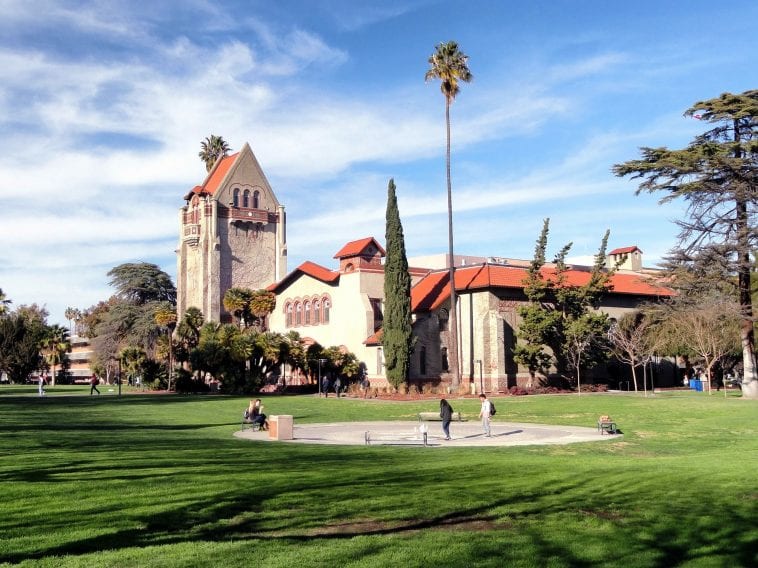
Image Source
As the admission season is approaching, students have a lot going on their minds. A lot of students are going to visit the campus of the colleges that they want to take admission to. A campus tour is the tour of the college campus arranged by the college authorities for the prospective students. The purpose behind a campus tour or college tour is to verse the prospective students with the campus of the college and the facilities provided by the college. Campus tours are usually free of cost as they promote the institution and are aimed at encouraging prospective students to attend the college.
The first step before filling the application forms for your dream college is to book a campus tour. Taking a campus tour help you get to know about the various facilities offered on the campus of the institute. Campus tours can be taken by all students including freshman, graduate, or transfer students. They can be in batches or conducted for everyone individually, depending from institute to institute.
But what after you have done the campus tour? It is our responsibility to thank the authorities for giving us the campus tour. So after you have completed the campus tour, you must write an email or a letter to the authorities thanking them for the efforts they took for arranging the tour for you. In the letter, you should mention all the things you liked or disliked about the campus tour and sincerely thank the authorities or the concerned person for giving the tour.
This article has some tips on how to write a perfect thank you letter to college authorities along with some sample templates for the same.
What is a Thank You Letter After Campus Visit?
A thank you letter after the campus visit is a letter written to thank the college for arranging the campus tour. It can be written by the student himself or parents, guardian, or anyone else who took the campus tour. The main aim of the letter is to express gratitude towards the authorities for making efforts towards arranging the tour for you. The letter can be sent by a prospective student, parents of prospective students, authorities considering making donations to the college, or anyone else.
Writing a thank you letter after campus visit is important as the college authorities make specific arrangements for the campus tours. They appoint specific people to give you the tour and make all other necessary arrangements. Thus, it is important to show your thankfulness to the college authorities.
When is it Required?
A thank you letter after campus visit is required after visiting the campus for the purpose of touring it. It is necessary as we must thank people who invest their time in our interests. If you are a prospective student and you recently went on a college tour to your dream college, then you must write a thank you letter.
A thank you letter after a college visit can also be written by people other than prospective students like Ranking agencies that visit campus. Usually, ranking agencies visit colleges periodically to assess the campus and facilities, and prepare the ranking lists. You can also tour the campus for deciding if you should consider making donations to a particular institute or not. However, if you do so then you should also you must write a thank you letter to the college for making the tour possible.
Tips for Writing an Effective Thank You Letter After Campus Visit
Writing a good thank you letter after a college visit is a vital thing to do. But this is not a general thank you note that we write every day. So the bigger question is how to write an effective thank you letter after a college visit. There are a few things that one must keep in mind before writing a thank you letter to the college authorities. As the letter is written to college authorities, it is a formal letter. So must keep in mind to write the thank you letter in the format of a formal letter.
Some of the important tips for writing an effective thank you letter after a campus visit are given below:
- Always follow the protocols of a formal letter. Write the letter in a proper format and do not use any informal terms.
- The motive of the letter is to thank the college authorities for arranging a tour so you should begin by saying thank you.
- Do not play around with words. State specific points and avoid repeating the same thing again and again.
- Give specific details about the college tour. Mention the aspects that you liked or disliked about the college campus.
- Talk about the guide that took you around the campus. Praise his efforts if you liked the tour given by him.
- Also, talk about the knowledge and expertise of the guide about the college campus.
- Your letter should be worded correctly and must be capable of expressing your gratitude and thankfulness towards the college authorities.
- Mention all the specific people you met on the campus to know more about the college like faculty, present students, head of departments, etc.
- Reiterate the main subject of the letter again in the closing lines. Thank the concerned authorities in a single line again before ending the letter.
- You must use the correct closing lines. The most common and apt closing words for a formal letter are ‘Sincerely’. It is advisable to use this.
For writing a good and efficient thank you letter after college visit or college tour, you must follow all the tips given above. However, if you do not want to frame a thank you letter yourself, then you can choose from the sample letters given here. You can pick these temples and just modify them according to your needs. These are ready to go templates, with just some customizations.
Template #1 (Thank You Letter after Campus Visit on behalf of the student)

Sender’s Address
Sender’s Email Address
Receiver’s Name
Receiver’s Job Title
Name of the College
College Address
Subject: Thank You Letter
I am writing this letter to thank you for your efforts, time, and dedication in giving me such a great tour of the college campus. I am amazed to see the beautiful green landscape of the campus. The campus seems to have spacious classrooms, a well-stocked library, well-equipped laboratories. I am impressed and surprised by the space of the theater hall, swimming pool, and exam halls. It is quite good to see so much greenery and different grounds for all sports activities. (Write the specific features of the campus that you learned about)
It is good that security is paramount important for the college. I could see that CCTV cameras are placed all over and a good amount of security staff is deployed at exit points. The use of smoke or fire alarm, and fire extinguishers is of great use on such a big campus. (Mention security features)
The on-campus dining halls, fully enabled Wi-Fi campus and transport shuttles service seems to be the cherry on the top. All these facilities make this a dream campus.
Thank you once again! I am looking forward to visiting campus soon, now as a student.
(Signature)
Sender’s Full Name
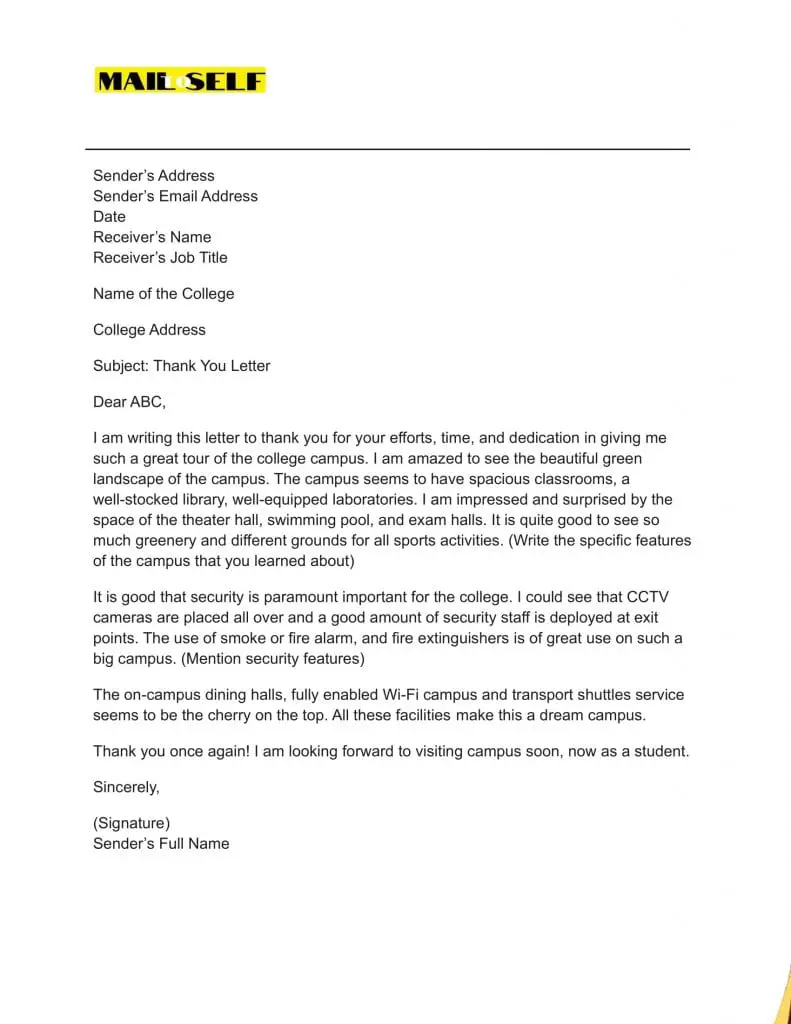
Template #2 (Thank You Letter after Campus Visit on behalf of the parent)
I am writing this letter to thank you for the efforts you have made throughout the campus tour. Being a parent I am very much concerned about the college my daughter will be going to. But after taking the campus tour I am happy to see that your college has such good academic faculty. I am pleased to see the varied extracurricular activities, such a big and stocked library, and good laboratories with skilled staff and different types of equipment.
I could see that the college has great placements from the data published by the placement cell. The various financial aids and scholarship which are provided by the college on various bases seem to be impressive.
As a parent, my child’s safety matters to me the most, and I am happy to find that the college has a fully residential campus with all safety norms. The campus is CCTV enabled and seems to have all safety norms against any firm accident. Having a distinct alumni base the college seems to be a good fit for my child.
Once again, thank you for your valuable time and perfect arrangement for our campus tour.
Sincerely,
XYZ (Your Name)
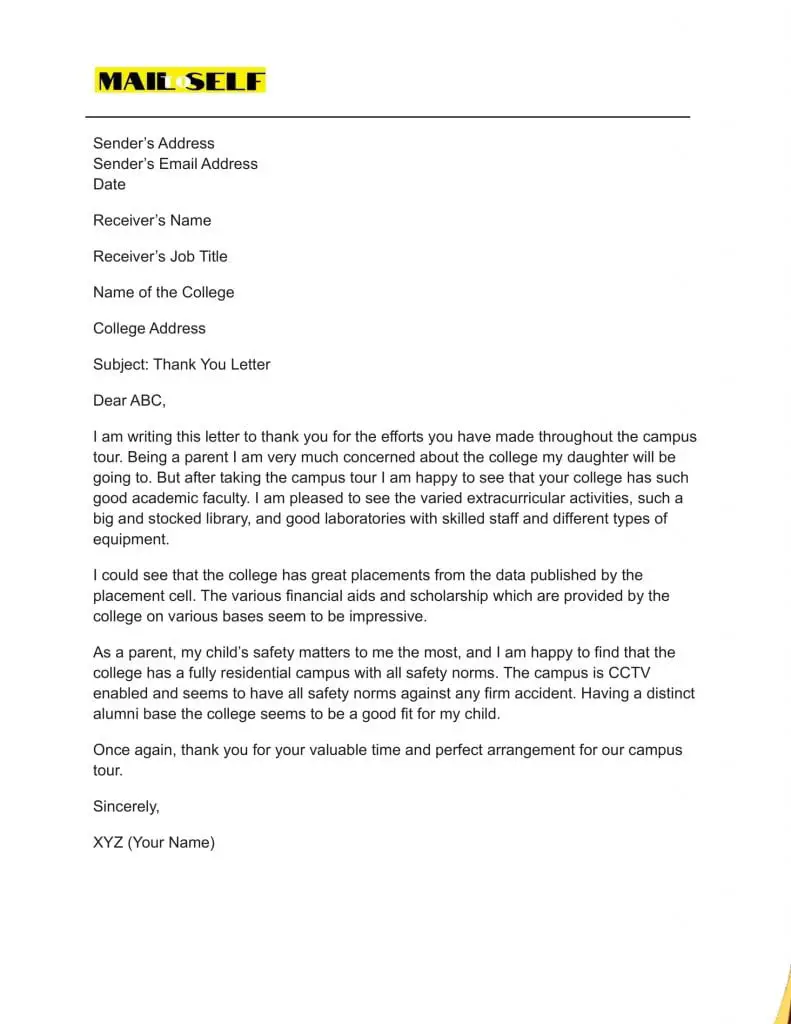
Template #3 (Thank You Letter after Campus Visit from the ranking agency)
Name of the Agency
Address of the Agency
Hi, I hope this letter finds you and your colleagues in a good health. I am writing this letter to thank you for the efforts you have made in arranging for our visit to your campus in these hard times.
As you know our ranking agency considers various points while ranking colleges. We consider points like campus area, infrastructure, green landscape, faculty, facilities, academics, extra circular, placement cell success, alumni success, student safety, campus resident facility, location, and many more.
This campus tour is of great help in ranking your campus. As we got a close view for all our points through this tour. The tour in charge was very frank, knowledgeable, patient, and an understanding person.
Thank you for all the arrangements and such a lovely lunch. Once again, we want to extend our sincere thanks to you and campus staff members and would like to meet again.
Name of your Agency
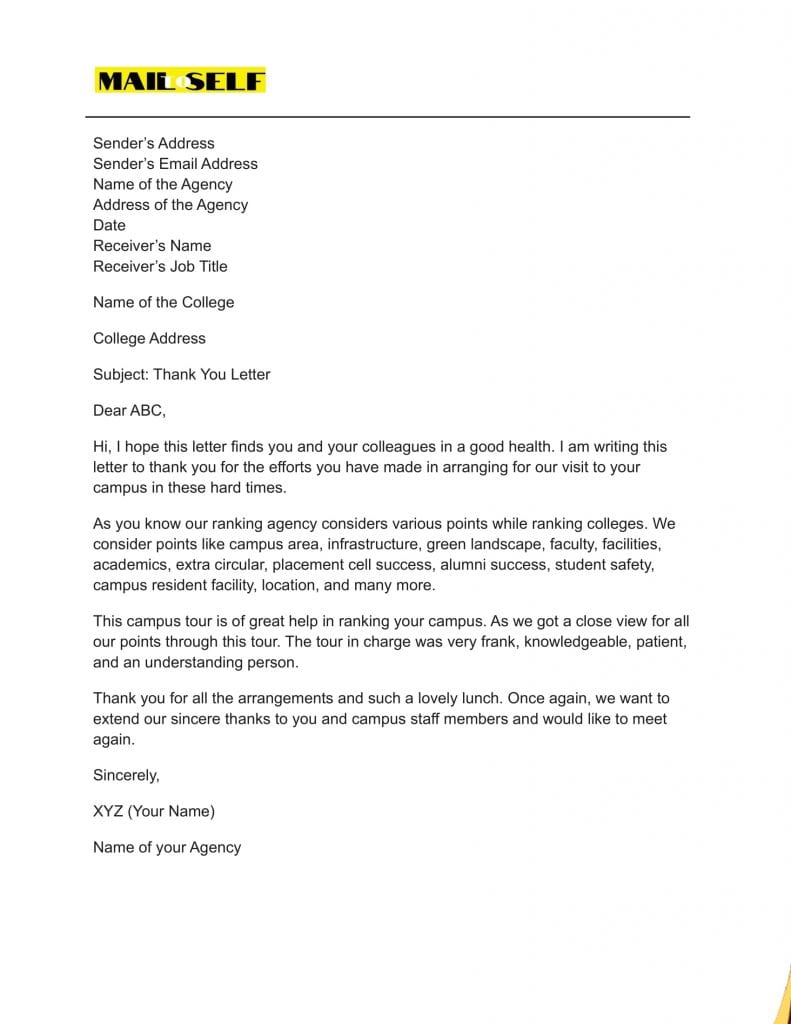
Template #4 (Thank You Letter after Campus Visit by educational organization)
Name of the Organization
Address of the Organization
Hi, I hope this letter finds you and your staff safe and in good health. I am writing this letter to thank you for giving us an opportunity to conduct a career counseling seminar on your campus. We are thankful to you for your efforts and arrangement for our campus visit.
This exposure to campus before conducting the seminar is a great help for our team. This will help us in planning and organizing all the details for seminars in a better way. As now we are aware of both the indoor and outdoor seating space we can plan seminar content on that basis.
Thank you for all the lunch and the arrangements. We would like to extend our sincere thanks to you. We are eagerly waiting to conduct the seminar on your beautiful campus.
Name of your Organization
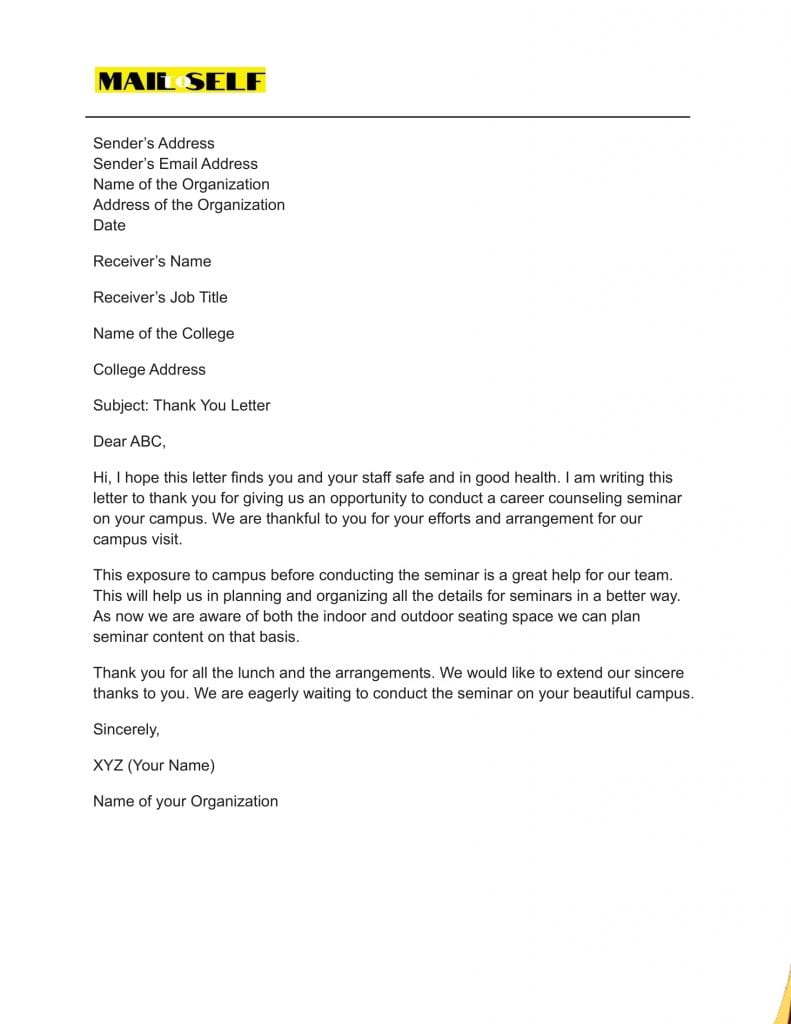
Template #5 (Thank You Letter after Campus Visit by Investors)
Hi, I hope this letter finds you and your staff safe and in good health. I am writing this letter to thank you for giving us an opportunity to visit your campus. We found your campus to be very innovative and the landscape is perfect.
This campus tour would be of great help for our company in deciding the fund/ loan to sanction for the development of the campus.
We are pleased by the arrangements made by campus staff for our visit. Looking forward to meeting you soon. Again, we sincerely thank you for your efforts.
XYZ (Your Name) Name of your Organization
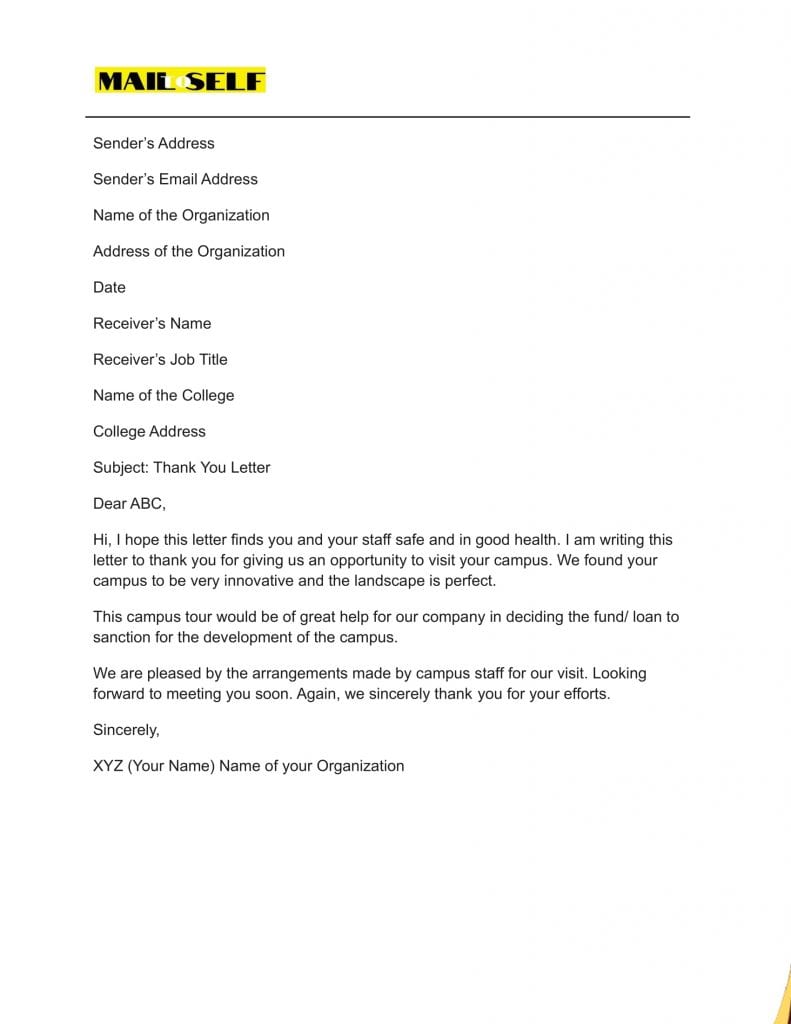
Thank You Letter To Parents On Wedding Day: How to, Templates & Examples

Thank You Letter for Christmas Gift: How to, Templates & Examples
© 2023 Mail To Self

Campus Visit Checklist
Bigfuture live event recordings, how to make the most of your trip.
Visiting a college campus helps you get a sense of what a college─and student life at that college─is like. This can help you decide whether the school is right for you .
When planning your campus visits, allow time to explore each college. While you're there, talk to as many people as possible. These can include college admissions staff , professors, and students. Below are some other things you can do while visiting. Note that some activities, such as meeting with an admissions officer or staying overnight in a residence hall, might need to be set up in advance.
Gather Information
Find out what you need to do to apply. See if the college's class and major offerings are what you want. Be sure to take the following steps:
- Take part in a group information session at the admissions office.
- Interview with an admission officer.
- Get information about financial aid options and deadlines .
- Sit in on a class that interests you. If classes aren’t in session, just see what the classrooms are like.
- Meet a professor who teaches a subject that interests you.
- Talk to students about what they think of their classes and professors.
- Get the names of the people you meet and their business cards so you can contact them later if you have questions.
Explore the Campus
Get a feel for student life and see if this college is a place where you will do well:
- Take a campus tour.
- Talk to current students about life on campus and the college.
- Check out the first-year residence halls. Stay overnight in a residence hall , if possible.
- Visit the dining hall, fitness center, library, career center, bookstore and other campus facilities.
- Talk to the coaches of sports that you may want to play.
- Walk or drive around the community surrounding the campus.
Check Out Campus Media
Tune in to learn what’s happening on campus and what’s on students’ minds:
- Listen to the college radio station.
- Read the student newspaper.
- Read other student publications, such as department newsletters, alternative newspapers and literary reviews.
- Scan bulletin boards to see what daily student life is like.
- Go to the career center and learn what services it offers.
- Browse the school’s website and any campus blogs.
Questions to Ask During Your Visit
Here are some questions you may want to ask your tour guide or students you meet on campus:
- What are the best reasons to go to this college?
- What’s it like to go from high school to college?
- What do you do in your free time? On the weekends?
- What do you love about this college?
- What do you wish you could change about this college?
- Why did you choose this college?
- What is it like to live here?
Adapted from Campus Visits and College Interviews by Zola Dincin Schneider.
What’s a campus visit?
A campus visit is a planned visit to a college or university campus. It involves a guided campus tour, information sessions, and meeting with admissions officers. Visitors can interact with current students, explore the campus community, and see if the college matches their interests and goals. The purpose is to provide firsthand experience and insight into the college's environment.
Why is it important to visit a campus?
Visiting a campus is important because it allows prospective students to get a feel for the college's atmosphere and culture. It enables you to explore the facilities, interact with current students, and envision yourself as part of the community. It also allows you to ask questions, gather information, and make an informed decision about your college choice.
How do I prepare for a campus visit?
Start by researching the college beforehand to familiarize yourself with its programs, activities, and campus layout. Create a checklist of areas you want to explore and questions you want to ask during the visit. Plan your visit by scheduling a campus tour and a meeting with an admissions representative.
What should I include in my college visit checklist?
Schedule a campus tour and attend an information session to learn about the college's programs and campus life. Arrange to sit in on a class and meet with an admissions representative to discuss your interests and ask questions. Engage with current students to gain insights into campus culture and explore campus facilities and the surrounding area. Take notes, gather information on financial aid, and follow up with a thank-you note or email after the visit.
How can I make the most of my college visit?
Plan well ahead if you want to make the most of your college visit. Research the college beforehand, including its programs, campus facilities, and student organizations. After the visit, review your college visit checklist and the notes you made. These will help you reflect on your experience and consider how well the college aligns with your goals and preferences.
Related Articles
How To Email A College Coach About A Visit?
If you’re at the point in your recruiting journey where you’re seriously considering colleges, you’re probably trying to plan visits. An unofficial visit can help you decide which school is the best fit for you. But how do you email a college coach about a visit?
To email a college coach about a visit, you should express your interest in their program and ask if they are available on some upcoming dates to meet with you on campus. Your tone should be polite and respectful, and you should precisely communicate what you would like from the coach, whether that’s a one-on-one meeting or a tour of the athletic facilities. Ideally, you will have been emailing the coach consistently and developed a relationship with them before planning an unofficial visit.
When you decide to email a college coach depends on what grade you are in. NCAA regulations prohibit Division I college coaches from communicating with student-athletes and their parents before June 15 of their sophomore year or September 1 of their junior year, depending on the sport. Although the NCAA doesn’t prohibit student-athletes from reaching out to college coaches, coaches may not reply if you try to set up a visit before these dates.
What To Include In Your Email To A College Coach About A Visit
There are a few points you should include in your email to a college coach about a visit. You might have been emailing the coach for a while before you plan a visit, so if you already have a relationship with a coach, you can be more informal. If you’re emailing the coach for the first time, following a format can help you organize your thoughts and minimize some of the anxiety around emailing a college coach.
Introduce Yourself: Start by introducing yourself, including your name, year, high school and position you play. It might even be a good idea to add those details in the subject line of the email. You want the coach to know who you are so they can think about where you would fit on their team. You can talk about some of your relevant skills or stats and include a link to your highlight video if you update it, or the coach hasn’t seen it before.
Express Interest: Although it may seem obvious, it’s essential to tell the coach you’re interested in playing for them. Coaches are looking for recruits committed to their school and willing to put in the work needed to be successful. You can show the coach this by doing your research on the school and explaining what specific things attracted you to the program. Try to connect yourself to the program, either through a short anecdote or comparing your athletic abilities to current players.
Make The Ask: The most important part of the email is letting the coach know you’re planning an unofficial visit. Be upfront and ask the coach if they’re available to meet with you one on one during your time on campus. Be flexible with scheduling and throw out a few dates to see what works for them. For the best chances of catching the coach at a good time, stay away from busy weekends like homecoming or weekends with big games.
Close Respectfully: To end the email, thank the coach for their time and let them know that you’re looking forward to talking to them. If the coach is interested in having you as a recruit, you can expect them to email you back within a week to schedule a time to meet.
Coaches receive hundreds of emails from potential recruits every year. To keep your email professional, make sure that your email address is appropriate, and double-check for spelling or grammar errors before sending it. Writing a professional and personalized email to plan a visit can help you stand apart from other recruits.
How To Plan An Unofficial Visit
Emailing a college coach is an integral part of planning an unofficial visit. Unofficial visits differ from official visits because you are responsible for paying for the visit and any expenses related to it. You’re also responsible for planning all the aspects of the visit. You should meet with the coach at every school you visit, but there are a few other things you should do at every school.
Tour Campus: Most schools provide campus tours for free through the admissions department. On an unofficial visit, you should sign up for a campus tour apart from the athletic department. Tour guides take prospective students through all the most well-known spots on campus, including the dining halls, dorms, libraries and class halls. A campus tour is a great way to get a feel for the college and get a sense of whether it’s a good fit for you.
Meet With Advisors: If time allows, you can schedule meetings with an academic advisor. Academic advising can help explain some of the best educational options and majors available to you at that school and evaluate whether you are on track to meet the academic requirements to be admitted to the university.
Practice With The Team: On some unofficial visits, you may have an opportunity to meet the team and practice with them. There are NCAA regulations that prevent every recruit from having to try out for the team, but depending on your sport and division, you may get a chance to work out with the team. You should bring some athletic clothes to wear if you get to work out with the team. Team workouts are a great way to assess your chemistry on the team and get a feel for the group dynamic.
Tour Athletic Facilities: You may also get the chance to tour the athletic facilities during an unofficial visit. If the coach has time, they can take you to where the team practices and plays. You can ask what their facilities are like during your meeting and see if they offer to show you around.
You can go on an unlimited number of unofficial visits, so you have plenty of opportunities to tour the campus and get a feel for the school.
How To Talk To A Coach On A Visit?
If you successfully emailed a college coach and have a visit planned, you’re probably thinking ahead about preparing for the visit. During your meeting with the coach, there are some things you should keep in mind.
Prepare Questions: You should be thinking about your most pressing questions for the coach. Think about some things that you’re curious about regarding the recruiting process or the team dynamic. You also want to ask questions relating to academics, like what kind of majors most of the players have or what academic support is available for student-athletes. Meeting with a coach during an unofficial visit is an excellent opportunity for you to ask any questions that might come up during your tour.
Do Your Research: Equally as important as preparing questions for coaches is to prepare answers. Do some research on the school so you’re ready to explain why you’re interested in the school and where you think you can impact the team. You should also research the coach and communicate what elements of their coaching style resonate with you.
Be Confident: Coaches want to get to know you during visits, so being open and approachable is essential to make a good impression. Confidence is key, and it is one of the best ways to stand out from other potential recruits. Coaches are looking for student-athletes who are confident in their abilities and willing to work with a team to become stronger. Letting the coach see your personality can help them decide whether you’d fit on the team.
Preparing for the visit ahead of time will help you make a good impression on the coach. Putting the work in now to research questions and develop some of your answers for commonly asked questions can pay off later on during the recruiting process.
Things To Keep In Mind
Parents: Many parents want to ease some of the pressure that student-athletes feel by reaching out to college coaches. However, most college coaches prefer to hear from the student-athletes to get a sense of how driven and capable they are. Student-athletes who can balance sports, school and recruiting prepare themselves for balancing many different priorities in college.
Coach’s Perspective: It’s important always to consider the coach’s perspective when you’re communicating. You want to think about how an email would sound to them and what aspects of the message would be most important. Coaches are very busy with their current team, besides just recruiting new players, so transparent and concise communication helps them out a lot.
Keep Reading?

Get In Touch!
If you would like your college or university featured in the series, please fill out our form and one of our producers will contact you shortly. If you are a high school college counselor, please follow this link here for a form specific to you.
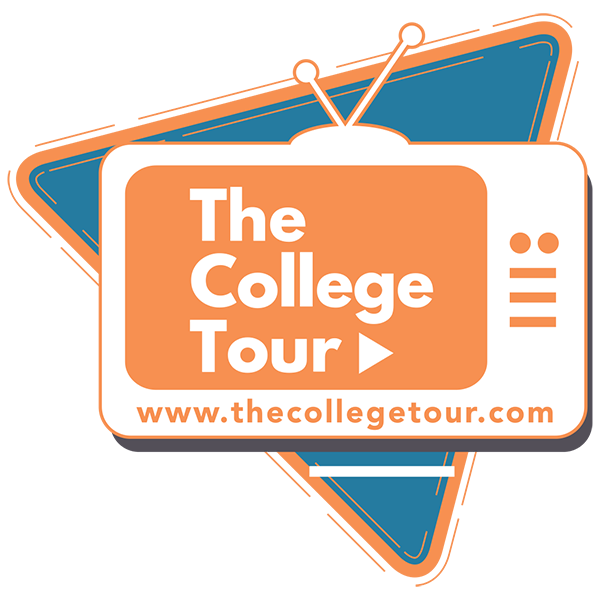
- Name * First Last
- College/University Name
- Address * City State / Province / Region Country Afghanistan Albania Algeria American Samoa Andorra Angola Anguilla Antarctica Antigua and Barbuda Argentina Armenia Aruba Australia Austria Azerbaijan Bahamas Bahrain Bangladesh Barbados Belarus Belgium Belize Benin Bermuda Bhutan Bolivia Bonaire, Sint Eustatius and Saba Bosnia and Herzegovina Botswana Bouvet Island Brazil British Indian Ocean Territory Brunei Darussalam Bulgaria Burkina Faso Burundi Cabo Verde Cambodia Cameroon Canada Cayman Islands Central African Republic Chad Chile China Christmas Island Cocos Islands Colombia Comoros Congo Congo, Democratic Republic of the Cook Islands Costa Rica Croatia Cuba Curaçao Cyprus Czechia Côte d'Ivoire Denmark Djibouti Dominica Dominican Republic Ecuador Egypt El Salvador Equatorial Guinea Eritrea Estonia Eswatini Ethiopia Falkland Islands Faroe Islands Fiji Finland France French Guiana French Polynesia French Southern Territories Gabon Gambia Georgia Germany Ghana Gibraltar Greece Greenland Grenada Guadeloupe Guam Guatemala Guernsey Guinea Guinea-Bissau Guyana Haiti Heard Island and McDonald Islands Holy See Honduras Hong Kong Hungary Iceland India Indonesia Iran Iraq Ireland Isle of Man Israel Italy Jamaica Japan Jersey Jordan Kazakhstan Kenya Kiribati Korea, Democratic People's Republic of Korea, Republic of Kuwait Kyrgyzstan Lao People's Democratic Republic Latvia Lebanon Lesotho Liberia Libya Liechtenstein Lithuania Luxembourg Macao Madagascar Malawi Malaysia Maldives Mali Malta Marshall Islands Martinique Mauritania Mauritius Mayotte Mexico Micronesia Moldova Monaco Mongolia Montenegro Montserrat Morocco Mozambique Myanmar Namibia Nauru Nepal Netherlands New Caledonia New Zealand Nicaragua Niger Nigeria Niue Norfolk Island North Macedonia Northern Mariana Islands Norway Oman Pakistan Palau Palestine, State of Panama Papua New Guinea Paraguay Peru Philippines Pitcairn Poland Portugal Puerto Rico Qatar Romania Russian Federation Rwanda Réunion Saint Barthélemy Saint Helena, Ascension and Tristan da Cunha Saint Kitts and Nevis Saint Lucia Saint Martin Saint Pierre and Miquelon Saint Vincent and the Grenadines Samoa San Marino Sao Tome and Principe Saudi Arabia Senegal Serbia Seychelles Sierra Leone Singapore Sint Maarten Slovakia Slovenia Solomon Islands Somalia South Africa South Georgia and the South Sandwich Islands South Sudan Spain Sri Lanka Sudan Suriname Svalbard and Jan Mayen Sweden Switzerland Syria Arab Republic Taiwan Tajikistan Tanzania, the United Republic of Thailand Timor-Leste Togo Tokelau Tonga Trinidad and Tobago Tunisia Turkmenistan Turks and Caicos Islands Tuvalu Türkiye US Minor Outlying Islands Uganda Ukraine United Arab Emirates United Kingdom United States Uruguay Uzbekistan Vanuatu Venezuela Viet Nam Virgin Islands, British Virgin Islands, U.S. Wallis and Futuna Western Sahara Yemen Zambia Zimbabwe Åland Islands Country
- Where did you hear about The College Tour?
- Enter email... *
- Title * I am a... Student Parent College Professional Other
- Hidden utm_source
- Hidden utm_campaign
- Hidden utm_content
- Hidden utm_medium
Winter is here! Check out the winter wonderlands at these 5 amazing winter destinations in Montana
- Travel Guide
How To Thank You For A Tour Guide At College
Published: December 12, 2023
Modified: December 28, 2023
by Tessa Stephens
- Plan Your Trip
Introduction
Going on a college tour can be an exciting and informative experience for prospective students. It is an opportunity to explore the campus, get a feel for the atmosphere, and gather essential information about various programs and facilities. One of the key individuals who plays a crucial role in making the college tour successful and engaging is the tour guide.
A tour guide at college serves as a knowledgeable and friendly resource, guiding visitors through the campus, providing valuable insights, and answering questions. They are often current students or alumni who have a deep understanding of the institution and its offerings. Their passion for their alma mater and their ability to convey information in an engaging manner can significantly impact the overall experience of the college tour.
Expressing gratitude and thanking the tour guide is important to acknowledge the effort, time, and dedication they put into ensuring a memorable and informative visit. It is a gesture that shows appreciation for their guidance throughout the tour and can leave a lasting impression.
In this guide, we will explore the different ways to express gratitude to a tour guide at college. From verbal expressions to written thank you notes and small tokens of appreciation, we will discuss how you can show your appreciation for their valuable assistance. Let’s delve into the details and uncover the various ways to say thank you to a tour guide at college.
Importance of a Tour Guide at College
When visiting a college campus, having a tour guide can greatly enhance the experience. A tour guide is more than just someone who walks visitors around the campus; they serve as a bridge of information between the institution and the prospective students. Here are a few reasons why a tour guide is crucial during a college visit.
- Insider Knowledge: Tour guides are usually current students or alumni who have firsthand experience of studying at the college. They possess in-depth knowledge about the campus facilities, academic programs, and student life. Their insights can provide valuable and authentic information that may not be found in brochures or on the college website.
- Personal Connection: Tour guides often share their personal experiences and anecdotes during the tour, creating a sense of connection between the prospective students and the college. They can offer insights into the campus culture, extracurricular activities, and the overall student experience, helping visitors envision themselves as a part of the college community.
- Customized Experience: While a campus map can provide an overview of the college, a tour guide can tailor the tour to the interests and questions of the visitors. Whether it’s highlighting specific academic departments, showcasing the library, or discussing housing options, tour guides can adapt the tour to meet the individual needs of the group.
- Addressing Concerns: College visits often involve important decision-making moments for prospective students. A tour guide can address any concerns or apprehensions that visitors may have. They can provide reassurance, share their own perspectives, and offer guidance to help alleviate any anxieties.
In summary, tour guides play a vital role in helping prospective students make informed decisions about their college choice. Their firsthand knowledge, personal connection, customized experiences, and ability to address concerns make them an invaluable asset during campus visits. Now, let’s explore how we can express gratitude to these dedicated individuals.
Understanding the Role of a Tour Guide
Before expressing gratitude to a tour guide, it is important to have a clear understanding of their role and responsibilities. Being aware of what tour guides do can help you appreciate their efforts even more. Here is a breakdown of the key aspects of a tour guide’s role:
- Knowledgeable Resource: Tour guides are well-versed in the history, traditions, and offerings of the college. They stay updated on the latest developments, changes in programs, and campus news. This enables them to provide accurate and up-to-date information to visitors.
- Engaging Storyteller: A good tour guide knows how to captivate the attention of the tour group by sharing interesting stories, anecdotes, and personal experiences. They can paint a vivid picture of campus life, introducing prospective students to the college’s unique aspects and highlighting its strengths.
- Navigator: Campus tours can be overwhelming, especially for first-time visitors. Tour guides are skilled at guiding groups around the campus, taking them to important locations, such as academic buildings, dormitories, libraries, and recreational areas. They help visitors familiarize themselves with the layout of the campus.
- Question Responder: Tour guides are there to answer any questions that visitors may have. Whether it’s about academic programs, admission requirements, campus resources, or student organizations, they strive to provide accurate and informative responses. They are also able to share their personal experiences to give a deeper understanding of the college.
- Ambassador: As representatives of the college, tour guides reflect the values and spirit of the institution. They exude enthusiasm, pride, and passion for their school, leaving a positive impression on visitors. By showcasing the college’s unique qualities, they contribute to the overall branding and image of the institution.
By understanding the multifaceted role of a tour guide, you can appreciate the effort, dedication, and expertise they bring to each tour. This understanding forms the foundation for expressing gratitude to these individuals who go above and beyond to make your college visit a memorable one.
Steps to Expressing Gratitude
Expressing gratitude to a tour guide is an important gesture to show appreciation for their valuable assistance during your college tour. Here are some steps you can take to express gratitude:
- Be Present and Engaged: During the tour, actively listen to the tour guide, ask questions, and show genuine interest. Being present and engaged not only reflects your appreciation for their efforts but also allows you to make the most out of the tour experience.
- Thank Them Verbally: One simple and direct way to express gratitude is by thanking the tour guide verbally. As the tour comes to an end, express your appreciation for their informative and engaging tour. A sincere “thank you” goes a long way in acknowledging their efforts.
- Write a Thank You Note: Consider writing a heartfelt thank you note to the tour guide. You can either hand it to them in person or send it via email. In the note, express your gratitude for their time, knowledge, and the positive impact they had on your college visit experience.
- Share Positive Reviews and Feedback: If the college provides an opportunity to leave feedback or write reviews about the tour guide, take advantage of it. Share your positive experience and highlight the tour guide’s exceptional qualities. This can serve as valuable feedback for the college and recognition for the tour guide’s efforts.
- Express Gratitude to Their Supervisor: In some cases, you may have the opportunity to share your positive experience with the tour guide’s supervisor or the admissions office. Take the time to express your appreciation for the excellent service provided by the tour guide. This can contribute to their recognition and may even reflect positively on their future opportunities at the college.
- Spread the Word: If you had an exceptional experience with a tour guide, share your positive experience with others who may be planning a college visit. Word-of-mouth recommendations can go a long way in recognizing the efforts of a tour guide and encouraging others to seek their guidance.
Remember, expressing gratitude is a meaningful way to acknowledge the tour guide’s dedication and efforts. By following these steps, you not only show your appreciation but also contribute to their personal and professional growth. Now let’s dive into some specific ways to show your gratitude to a tour guide at college.
Verbal Thank You
A verbal thank you is a simple yet effective way to express your gratitude to a tour guide. It allows you to personally acknowledge and appreciate their efforts. Here are some tips for offering a verbal thank you:
- Choose the Right Moment: Find an appropriate moment during or at the end of the tour to express your gratitude. This could be when the tour guide asks if anyone has any questions or when the tour is wrapping up.
- Be Sincere and Genuine: When thanking the tour guide, make sure your gratitude comes from the heart. Be sincere and genuine in your words, conveying your appreciation for their expertise, enthusiasm, and helpfulness.
- Use Specific Examples: Share specific moments from the tour that made an impact on you. For example, you can mention how their personal stories brought the campus to life or how their knowledge about the academic programs helped you gain insight.
- Show Enthusiasm: Express your enthusiasm and excitement for the college tour. Let the tour guide know how their guidance has made a positive impression on you and how you are looking forward to the college experience.
- Body Language and Eye Contact: While expressing your thanks, maintain eye contact and positive body language to convey your appreciation earnestly. A smile and direct eye contact can reinforce your gratitude.
Remember, a verbal thank you allows you to provide immediate recognition and serves as a thoughtful gesture to acknowledge the tour guide’s efforts. However, it is also important to follow up with a more tangible expression of gratitude. In the next section, we’ll explore the importance of a written thank you note.
Written Thank You Note
A written thank you note is a thoughtful and personal way to express your gratitude to a tour guide. It allows you to convey your appreciation in a more tangible and lasting manner. Here are some tips for writing a meaningful thank you note:
- Start with a Greeting: Begin the note by addressing the tour guide by their name. For example, “Dear [Tour Guide’s Name].” This adds a personal touch to the note and shows that it is specifically meant for them.
- Express Your Gratitude: Start the note by expressing your appreciation and gratitude for their time, guidance, and knowledge shared during the tour. Use heartfelt words to convey how much you valued their assistance.
- Share Specific Experiences: Recall specific moments from the tour that made a positive impact on you. This could be a particular story they shared, a part of the campus they showed you, or any interesting insights they provided. Mentioning these details shows that you were actively engaged during the tour.
- Highlight the Impact: Share how the tour guide’s efforts have influenced your perception of the college and how they have helped you envision yourself as a part of the campus community. Emphasize the positive impact they have had on your decision-making process.
- Express Future Intentions: Briefly mention your future intentions, such as your desire to apply to the college, attend an open house, or further explore the academic programs. This demonstrates your enthusiasm and interest in continuing your journey with the college.
- End with a Thank You and Best Wishes: Conclude the note by reiterating your gratitude and offering thanks once again. Wish the tour guide all the best in their studies or future endeavors.
- Hand Delivery or Email: Decide whether you want to hand-deliver the thank you note to the tour guide in person or send it via email. Both options are acceptable, but hand delivery adds a personal touch.
A written thank you note is a tangible way to express your gratitude and allows the tour guide to revisit your appreciation whenever they read it. It is a heartfelt gesture that will be remembered long after the tour concludes. However, if you want to go the extra mile, consider small gifts or tokens of appreciation, which we will explore in the next section.
Small Gifts or Tokens of Appreciation
While not necessary, giving a small gift or token of appreciation can be a meaningful gesture to thank a tour guide for their exceptional service. It shows that you went the extra mile to express your gratitude. Here are some ideas for small gifts or tokens of appreciation:
- A Handwritten Thank You Card: Along with a thank you note, consider including a handwritten card expressing your appreciation. The effort put into writing a personal message on a beautiful card adds a special touch.
- A College-Themed Gift: Consider giving a small college-themed gift that showcases your appreciation. It could be a keychain, a mug, a pen, or any item with the college’s logo or colors.
- A Book or Journal: If you know the tour guide’s interests or fields of study, consider gifting them a book or a journal related to that area. This shows thoughtfulness and acknowledges their passion for learning.
- A Gift Card: A gift card to a local café or bookstore allows the tour guide to treat themselves to something they enjoy. It’s a versatile option that allows them to choose what they prefer.
- Baked Goods or Treats: If you have a talent for baking, consider making some homemade cookies or other treats as a gift. Wrapping them in a personalized package adds a special touch.
When giving a small gift, it’s important to keep in mind that it should be appropriate, thoughtful, and not overly expensive. The gesture is meant to convey your appreciation, rather than create an obligation for the tour guide.
It’s worth noting that some colleges have specific policies regarding gifts to staff or tour guides, so be sure to check with the admissions office or follow any guidelines they provide.
Remember, while a gift can be a meaningful way to show your appreciation, it’s not the only way. Verbal and written expressions of gratitude hold their own significance, and ultimately, it’s the thought behind the gesture that matters most.
Next, we’ll explore the importance of sharing positive reviews and feedback to express your gratefulness to a tour guide at college.
Sharing Positive Reviews and Feedback
Sharing positive reviews and feedback is an impactful way to express gratitude to a tour guide. It not only recognizes their exceptional work but also helps other prospective students benefit from their guidance. Here are some ways to share your appreciation:
- Online Review Platforms: Many colleges have online platforms or websites where visitors can leave reviews. Take the time to write a detailed review highlighting your positive experience with the tour guide. Share specific examples of their knowledge, enthusiasm, and helpfulness.
- Social Media: If the college has social media accounts, consider sharing your positive experience with the tour guide on those platforms. Use a hashtag that the college uses or tag the college’s official account to increase visibility.
- Email or Letter to the Admissions Office: Consider sending an email or a letter to the admissions office of the college, expressing your gratitude and praising the tour guide’s exceptional service. This not only recognizes the tour guide but also provides valuable feedback for the college.
- Recommendation for the Tour Guide: If you have the opportunity to provide a recommendation for the tour guide, take the time to write a detailed and positive recommendation letter. Highlight their professionalism, knowledge, and ability to create an engaging and informative tour.
- Inform Friends and Family: Share your positive experience with friends, family, classmates, or anyone you know who might be interested in visiting the college in the future. Personal recommendations can be influential and may encourage others to seek out the tour guide’s expertise.
By sharing your positive reviews and feedback, you not only express your gratitude to the tour guide but also contribute to their recognition and personal growth. Your heartfelt words can inspire and uplift the tour guide while also helping future visitors make informed decisions about their college choice.
While expressing gratitude through reviews and feedback is important, it’s also essential to acknowledge the tour guide’s impact on your personal college journey, as we’ll discuss in the next section.
Acknowledging the Tour Guide’s Impact
It is vital to acknowledge the significant impact that a tour guide can have on your college journey. Their dedication, knowledge, and passion can shape your perception of the college and play a role in your decision-making process. Here are some ways to recognize and acknowledge the tour guide’s impact:
- Personal Reflection: Take some time to reflect on your college tour experience and evaluate the positive influence the tour guide had on your perception of the college. Consider how their knowledge and enthusiasm shaped your understanding of the institution and its offerings.
- Express Your Gratitude: Express your heartfelt gratitude to the tour guide directly, whether through a verbal thank you, a written note, or an email. Specifically mention the impact they had on your college journey and how their guidance contributed to your understanding and decision-making process.
- Share Your Story: Share your college tour experience with others and highlight the impact the tour guide had on your perception of the college. Whether it’s through conversations, social media posts, or online reviews, let others know the value the tour guide brought to your journey.
- Attend Open House Events: If the college offers open house events, consider attending and sharing your positive experience with the tour guide. It gives you an opportunity to personally thank them again while showcasing their contribution to the college community.
- Stay in Touch: If you establish a rapport with the tour guide, consider staying in touch with them throughout your college decision process. You can reach out to ask further questions or seek their advice on specific aspects of the college.
- Refer Others: If you know someone who is interested in touring the college, recommend the tour guide who made a positive impact on your own experience. By referring others, you contribute to the recognition and continued success of the tour guide.
Acknowledging the tour guide’s impact is a meaningful tribute to their dedication and passionate efforts. It not only shows your appreciation but also allows others to recognize the valuable role tour guides play in helping prospective students navigate their college choices.
As we conclude, it’s important to remember that tour guides dedicate themselves to creating meaningful and informative experiences for visitors. By expressing gratitude and recognizing their impact, we honor their contributions to the college community and encourage their ongoing commitment to helping future students.
Expressing gratitude to a tour guide at college is an essential way to acknowledge their dedication, expertise, and impact on your college journey. From verbal thank yous to written notes, small gifts, and sharing positive reviews, there are various ways to show appreciation for their valuable assistance.
The tour guide plays a crucial role in providing insider knowledge, creating a personal connection, and helping visitors navigate the campus during a college tour. Their enthusiasm, expertise, and ability to address concerns contribute to a memorable and informative experience for prospective students.
By understanding the role of a tour guide and following the steps to express gratitude, you can show your appreciation in a meaningful way. Whether it’s through a verbal thank you, a handwritten note, or a small token of appreciation, your gesture will be cherished by the tour guide.
Additionally, sharing positive reviews and feedback about the tour guide’s exceptional service can contribute to their recognition and personal growth. By acknowledging the impact they had on your college journey, you help others make informed decisions and encourage the tour guide’s ongoing commitment to guiding prospective students.
In conclusion, expressing gratitude to a tour guide at college is not only a sign of appreciation but also a way to recognize their efforts and inspire them to continue making a difference in the lives of prospective students. So, the next time you go on a college tour, take the time to express your gratitude and leave a lasting impression on the tour guide who made your experience exceptional.

- Privacy Overview
- Strictly Necessary Cookies
This website uses cookies so that we can provide you with the best user experience possible. Cookie information is stored in your browser and performs functions such as recognising you when you return to our website and helping our team to understand which sections of the website you find most interesting and useful.
Strictly Necessary Cookie should be enabled at all times so that we can save your preferences for cookie settings.
If you disable this cookie, we will not be able to save your preferences. This means that every time you visit this website you will need to enable or disable cookies again.
- High School
- College Search
- College Admissions
- Financial Aid
- College Life

Juniors, Now’s the Time to Schedule Your College Visits
Juniors, it’s time for you to get started on college visits.
Whether you’re thinking about knocking out one or two or hitting a series of colleges, here is your go-to guide for setting up a college visit.
We’ll walk you through a steps to take before, during and after visits to help you find your perfect fit.
And if COVID-19 protocols are still underway, don’t miss our article about what to do when you can’t tour colleges in person .
What Can Juniors Do Right Now?
Juniors can do a lot right now, including developing a checklist and other things you can put on the family calendar.
Step 1: Start talking.
That’s right. Sit down and have a conversation with your family.
What are you thinking you want to do for college? Do you think you want to go to a large school? A small school? What fits your personality and preferences?
Start talking with adults you trust about schools that make sense for your needs.
Step 2: Brainstorm.
Have no idea where to start? Start a brainstorming session where you write down your visions about what you think your college experience might be like.
Rather than throwing a dart at a map and jumping in the car, it’s a good idea to ask yourself a few questions:
- Do you see yourself going to a large or small school?
- Do you want a lot of personalized attention?
- Are you looking for a more selective institution?
- How far away from home do you want to live?
- When you envision college, what do you think of?
In other words, think broadly about your college visit choices, then think more narrowly about the colleges you’d like to visit.
Put a premium on relationships when you make this list.
What kind of people do you want to meet? What type of individuals do you want to learn from?
Remember, college is about way more than pretty residence halls, beautiful buildings and other aesthetic things. It’s about the people who influence you along the way.
Step 3: Research at least one college.
Choose at least one college and do as much research as you can. Learn more about that particular school’s:
- Admission criteria
- Results — how many students go to graduate school, get a job after graduation, etc.
- School profile
- Academics and selectivity: Are you looking for a serious academic environment? Would you rather go to a school that focuses on undergraduate teaching — or research?
- Potential majors
- Housing information
- Extracurricular activities
- Athletics opportunities
After you narrow down some of the “big” things, like distance from home and general experience, then you can start thinking about things like major, requirements and more.
Does this college college or university you’ve researched fit the bill? If not, look for another one. If that one makes sense, move toward school as your first visit.
Step 4: Check the calendar.
Once you’ve honed in on your first college to visit, figure out what visit day fits into your schedule. Check your calendar and your family members’ calendars too. Remember, mom and dad likely have to drive you to your visit or coordinate flights. You need to plan the visit with your parents, and you might need to make sure your brothers’ and sisters’ schedules are open too.
How to Set Up a College Visits
First of all, make sure you (the student!) call the schools where you’re interested in setting up a visit.
Your mom or dad should not make the call. It’s time to put some of those adulting skills into practice.
Step 1: Think through what you want to do on your visit.
Who are the must-see people on your radar—the soccer coach, tutoring center, a financial aid advisor? It’s OK if you’re not sure. You can work through some of these questions when you make your phone call to the admissions office.
Step 2: Call the college or university’s admissions office.
Don’t set up a visit online. Talk to an actual person.
Or, if you do set up a visit online, call and make sure the admissions office received your scheduled visit—and that it didn’t get lost in cyberspace.
Have a detailed conversation about what you’d like to do when you’re on the visit.
Step 3: Ask for a personal campus visit.
Try to steer clear of group visit days.
Naturally, you’re an individual and have specific interests and needs.
When you’re stuck on a group visit, no one student will have the same interests as you. You could get stuck touring the gym for 25 minutes of your hour-long tour (even if you’re not an athlete or hate the thought of a treadmill). Who wants that?
A personal campus visit ensures your visit is all about you and nobody else.
Step 5: Get ready!
You don’t want to start a college visit without doing some preparation. You want to know as much as possible about the college you’re visiting before you visit.
Simple. You don’t want to waste time learning stuff you already know. If you already know the basics, like the size of the college, majors available and costs, why spend time relearning stuff you already know?
Plus, it brings camaraderie with the admission staff or chemistry professors when you say, “Yeah! And that biochemistry secondary major—that sounds cool.”
You’ll never believe how much people’s eyes light up when you know something about the college or university already.
What to Do During/After Visits
When you arrive at the admissions office, go to the campus visit coordinator’s desk and introduce yourself. That individual will help you get your day started in the right direction.
While you’re on your visit, do your best to ask great questions. You want to think of questions before you visit and ask everyone questions. Get each person talking about the college or university you’re visiting. It’s best to get candid thoughts from each individual you talk to.
This may sound like a pain, but it’s a good idea to get all your thoughts together and take a minute or two to jot down all your initial reactions to the college you’ve just visited. Grab your phone and type in some notes on the card or plane ride home.
Believe it or not, it’s difficult to remember each individual school after your 10th college visit.
Now’s the Time!
Juniors, we’ve offered everything you need to know about how to schedule a college visit .
It’s a matter of sitting down with your family members or other trusted adults, pouring over Niche’s 2021 college rankings and making lists of what matters to you.
It’s going to be a great time, so have fun with the process.
Ready to Find Your Niche? Create an Account
Author: Melissa Brock
Melissa Brock is the founder of College Money Tips and Money editor at Benzinga. She loves helping families navigate their finances and the college search process. Check out her essential timeline and checklist for the college search!
More Articles By Niche
While many current college students tout the importance of being able to actually step foot onto the campus you might go to, sometimes the circumstances just do not work out.
At Niche, we know a college is more than its stats or buildings. We also know it can be hard to figure out a college’s vibe or how students feel about it from its website alone. Using our comprehensive college profiles and social media accounts, you can get a sense of what life at a college is really like. Here are three simple ways to do that.
In case you haven’t heard yet, Niche has an amazing new opportunity for high school seniors. Niche Direct Admissions is a program that allows participating colleges to accept students and offer scholarships based on their Niche Profile. That’s right — no application needed.
College Visits Essentials: Making the Most of Your Campus Tours
College visits essentials.
Embarking on college visits and campus tours marks a significant milestone in the college search process. These experiences offer invaluable opportunities for prospective students to explore potential colleges firsthand, gaining insights into campus life, academics, and extracurricular opportunities. As you begin compiling your college list and narrowing down your choices, college visits can help you make informed decisions about your future.
In this article, we’ll delve into the essentials of college visits, offering practical college visit tips and a college visits checklist for maximizing your experience . We will cover everything from uncovering the questions you should ask during a college tour to understanding how to schedule and plan college visits effectively. And, we’ll look at things you may not have thought about, including having virtual college visits, conducting a self-guided tour, and navigating college campus tours safely and effectively.
We promise this article provides everything you need to know regarding the college visit process. Whether you’re just beginning your college search or fine-tuning your college list, these insights will help you navigate the complexities of the college visit process with confidence.
Let’s get started!
Are College Visits Important?
When making one of the most significant decisions of your academic career, the role of college visits in the college search process cannot be overstated. College campus tours are a crucial part of the decision-making process, offering firsthand insights that can influence your college search.
First and foremost, college visits allow you to immerse yourself in the campus environment and explore academic facilities, dormitories, and recreational amenities. Whether you’re passionate about conducting research in state-of-the-art laboratories or participating in vibrant student organizations, visiting a college in person lets you assess whether it offers the resources and opportunities you seek.
Moreover, college visits offer the chance to interact with current students, faculty members, and admissions staff, providing invaluable perspectives on academics, extracurricular activities, and campus life. These personal connections offer unique insights you simply can’t gain from a website or brochure.
Ultimately, the information and impressions gathered during college visits can significantly impact your college choice. By experiencing campuses firsthand, you can effectively consolidate your college list and compare your top colleges by understanding which colleges resonate with you. Before you make your final decision , you can use the information collected on the campus tours to demonstrate your interest in the college or university, increasing your chances of acceptance.
What Should I Ask On A College Tour?
While college visits and campus tours provide invaluable firsthand experiences , it’s essential to do your homework before stepping foot on any campus. Here’s one of our “pre” college visit tips–conduct thorough research beforehand to help you make the most of your visit. By asking the right questions , you can gather the information you need to make an informed decision about your college choice.
Questions about academics
One crucial aspect of pre-tour research is identifying academic programs and resources that interest you. Take the time to explore the college’s website and familiarize yourself with the range of majors, minors, and academic opportunities available. Here are a couple of questions you may want to ask:
- Can you provide more information about the [specific major/program]?
- Are there opportunities for undergraduate research or internships in [area of interest]?
Questions about campus life
In addition to academic offerings, consider campus life and student services that you would like to know more about. Research the college’s extracurricular activities, student organizations, and campus events to understand the social and cultural opportunities available. Here are other questions you may want to ask:
- What types of student organizations are active on campus?
- Are there opportunities for community service or volunteer work?
More college visit questions
Furthermore, consider other aspects of the school that might not be immediately obvious. Research housing options for juniors, including on-campus dormitories, off-campus apartments, and housing policies for upperclassmen. Also, consider things like parking availability and policies regarding cars on campus. Consider asking questions such as:
- What are the housing options for upperclassmen, and how is housing assigned?
- Is parking available on campus for students, and are there any restrictions on bringing cars?
Conducting thorough research, and making your college visits checklist, is essential for making the most of any college visit.
How Many College Visits Should I Do?
When determining how many college visits you should do, you’ll need to strike a balance between quantity, quality, and expense. While visiting as many colleges as possible may seem ideal, college visits can get pricey. Therefore, it’s crucial to personalize your college visit plan to ensure that you make the most of your time, energy, and financial resources.
Here are some steps you can take to help prioritize your college visits and ensure you are completing the right number of college campus tours:
Four Steps to Planning College Visits
1. start with a broad college list.
Have a wide range of colleges that interest you, encompassing various types of campuses such as big versus small, urban versus rural, and public versus private institutions. Consider including HBCU college tours or schedule one or two Harvard tours. Having a broad college list lets you gain insights into the diverse campus environments and refine your preferences accordingly.
2. Prioritize your top choices
Once you’ve identified your top 3-5 colleges on your college list, prioritize visiting these campuses. Consider planning multiple trips in various capacities if you’re highly interested in a particular school. For example, you can schedule an online UCLA campus tour. Then, schedule an in-person prospective student UCLA campus tour. You can even conduct a self-guided tour versus an official UCLA campus tour to have more flexibility in where you’ll get to go on campus.
3. Balance depth with practicality
While visiting as many colleges as possible can be beneficial, consider the practicalities of your college visits checklist. Virtual college tours and information sessions can be valuable alternatives for colleges that are harder to visit in person. For instance, Harvard tours can be in-person or virtual. Therefore, if Harvard is on your list, plan your Harvard tours accordingly based on your availability and resources.
4. Consider special programs
If you’re invited to special programs for admitted students or specific academic departments, prioritize these college visits. Special programs through HBCU college tours or college visits for juniors often offer opportunities to interact with faculty, current students, and other admitted students, giving you a firsthand glimpse into life on campus.
Next, let’s discuss how to plan and schedule a college visit.
How To Schedule College Visits
Planning your college visits involves careful coordination and scheduling to ensure you make the most of your time on campus. From considering academic calendars to contacting college admissions offices, here are some college visit tips regarding scheduling your campus tours effectively.
Here are two of the most important things to keep in mind when working on the logistics of your campus visits.
How to Work on Logistics of Campus Visits
Consider academic calendars.
Plan your college visits around academic calendars. Before scheduling your college visits, consider the academic calendars of the colleges you plan to visit. Check their websites to determine the dates of important events, such as orientation sessions, midterm exams, and holidays. This is important whether you are planning college visits for juniors, HBCU college tours, or any other kind of college visit.
Contact Admissions Offices
Contact college admissions for tour scheduling. Once you’ve identified potential college visit dates, it’s time to contact the admissions offices or go to the admissions website to schedule your campus tours. Most colleges offer guided campus tours led by student ambassadors or admissions staff. Additionally, many schools host information sessions that provide an overview of the college’s programs, resources, and admissions process.
Scheduling college visits: step-by-step
Let’s take a look at a hypothetical example to better understand the steps it takes to schedule a campus tour. Imagine you’re a high school student living in Chicago. You have already completed a University of Chicago tour, and now, you’re interested in scheduling a tour of the University of Southern California (USC) in Los Angeles. As an in-state college, accessing the University of Chicago tour may have been simple. But let’s look at how you can navigate the scheduling process of an out-of-state college tour:
Navigating an Out-of-State College Tour
- Research USC’s academic calendar to identify optimal visit dates that align with your availability.
- Visit USC’s admissions website to find information about campus tours and information sessions. Determine whether USC offers guided tours, self-guided tours, or virtual college visits for prospective students unable to visit in person.
- Use the USC campus tours website to schedule your campus tour. In addition to scheduling an admissions tour and presentation, consider scheduling an academic department presentation.
- Upon confirmation of your campus tour reservation from USC’s admissions office, make travel arrangements from Chicago to Los Angeles. This includes booking flights, accommodations, and transportation to and from the USC campus.
- Plan your itinerary for your visit to USC. Consider attending guided campus tours, participating in information sessions, exploring campus facilities, and engaging with current students and faculty members.
- During your visit, bring your college visits checklist. Take notes, ask questions, and gather information to help you decide whether USC is the right fit for you.
Since the cost of college visits is a big factor to take into consideration during the planning process, let’s discuss it further.
Are College Visits Free?
As you begin to make your college visit list, you’ll need to understand the costs associated with college visits. While some campus tours may be free, others require careful budgeting and planning to manage expenses.
College visits can incur various expenses, including transportation, accommodation, meals, and miscellaneous fees. While some colleges offer free guided campus tours and information sessions, others may charge a nominal fee for certain services or events.
Tips for managing the cost of college visits
To manage the costs associated with college tours effectively, consider the following college visit tips for budgeting and finding free visit opportunities:
Start planning your campus tours well in advance to take advantage of early booking discounts and special promotions. Research travel options, accommodations, and local amenities to identify cost-saving opportunities and plan your itinerary accordingly.
Utilize virtual college tours
Besides visiting colleges in person, explore virtual college tours offered by colleges and universities. Many institutions, such as Boston College and Harvard University , provide virtual college visits and information sessions that allow you to explore campus facilities, interact with admissions staff, and learn about academic programs from the comfort of your home at no cost.
Explore fly-in programs
Several colleges and universities offer fly-in programs. These programs typically cover travel expenses, accommodations, meals, and participation in campus activities, allowing students to experience campus life firsthand without incurring any costs.
Speaking of fly-in programs, let’s learn a little more about them.
Fly-in programs
Here are three great fly-in programs/opportunities for low-income students.
1. QuestBridge College Prep Scholars Program
College visits for juniors are incredibly important. QuestBridge offers a College Prep Scholars Program for high-achieving, low-income high school juniors which, you guessed it, sponsors college visits for juniors. This program provides participants access to college admissions resources, mentorship opportunities, and fly-in college visits for juniors to top colleges and universities across the United States. Beyond giving fly-in college visits for juniors, QuestBridge takes it a step further and will help fund your attendance to top summer programs at some of the most prestigious colleges in the country.
2. Tulane University, PreviewTU Program
PreviewTU is a campus visit program at Tulane University that typically occurs in the fall. While open to all, students who identify as first-generation college attendees, LGBTQIA+, are from low-income backgrounds or rural/small-town residents, and/or students of color are particularly encouraged to attend. The program is offered both virtually and in person. PTU activities include campus tours, student panels, admissions and financial aid sessions, lunch with Diversity Fellows, and opportunities to connect with professors and support partners. Financially disadvantaged students may qualify for partial travel reimbursement stipends of up to $500 for themselves and one guest.
3. Massachusetts Institute of Technology, Weekend Immersion in Science and Engineering (WISE)
MIT’s Weekend Immersion in Science and Engineering (WISE) is a three-day program for rising seniors to explore MIT life. It’s fully funded, covering transportation to and from MIT. Applicants from underrepresented backgrounds, including Black, Latinx, and Native American students, those from lower socioeconomic statuses, and first-generation students, are strongly encouraged to apply. WISE typically occurs in September. Participants reside on campus with MIT undergraduates, engaging in academic and campus life activities. They meet peers and faculty and attend college admissions and financial aid workshops. Applications are due in August, and the program generally takes place in October.
At this point, we’ve covered college visit tips for preparing for your visit. Now, let’s discuss what to do when you’ve finally made it to campus!
Things To Do On A College Visit
As shared earlier, college visits offer students a chance to get a feel for the college campus and community. Therefore, while on a college visit, it’s important to take advantage of all the things to do on campus and within the surrounding community or area. Here are 3 things to do on your college tours and college visits:
3 Things To Do on College Visits
1. attend information sessions and campus tours.
This may seem obvious but don’t bail on the planned tours and sessions. They’ll give you valuable information about the school and campus. These parts of the college visit are just as important as exploring on your own. Don’t forget to bring your list of questions and ask about anything that isn’t answered!
2. Inquire about attending classes or talking to current students
Besides attending information sessions and campus tours, ask about the possibility of attending classes or speaking with current students during your visit. Observing a class in your area of interest can provide valuable insights into the college’s academic rigor and teaching style. Similarly, chatting with current students can offer firsthand perspectives on the overall student experience.

3. Explore the campus
Don’t be shy when you’re visiting a college’s campus. Wander around and imagine yourself living or studying there. Check out all the different areas of campus. Basically, get a feel for the vibe of the school–trust your intuition and see if it feels like a fit.
Don’t forget to consider the area outside of campus. Evaluating the surrounding community of a college campus can provide valuable insights into the overall quality of life and opportunities available to students during their college experience. Think about the amenities and resources that are important to you. Consider adding these questions to your college visits checklist. Are there nearby music venues, art galleries, or cultural attractions that align with your interests? What transportation options are available, including airports or public transit systems? No detail is too small to ask about on your visit to campus.
When Should You Start Visiting Colleges?
Navigating the college search process is undoubtedly complex. Next, we will cover some tips on when to set up your first college visit. There isn’t a hard and fast rule to this question, but there are certainly some best practices when it comes to planning college visits.
It is never too early to begin visiting colleges. College admissions offices receive tour requests from students as young as 6 th grade. If you plan to visit a college any time before your 9th-grade year, it is important to remember that you may need to tour the college again before applying and certainly before enrolling.
Going on a college visit as a younger student can begin planting the seeds for what college is like. But very rarely will a college visit before high school provide you with meaningful admissions information that you will be able to retain and act on when it is time to submit your application.
College visits for juniors and seniors
As you get closer to your junior and senior year of high school, college visits become more than just an opportunity to understand college more broadly. College visits for juniors and seniors can help students discover their preferences. At this stage of the college search process, students can begin to discern the type of college campus they might see themselves ultimately enrolling at.
Whether you are on a UCLA campus tour in California, a University of Chicago tour in Illinois, or a Harvard tour in Massachusetts , you can begin to explore your regional preferences. Additionally, experiences on HBCU college tours can give you some insight into distinct institutional types. Note how you felt about your HBCU college tours at institutions like Spelman College or Howard University compared to other universities. College visits do more than show you what colleges you might like, they also expose you to colleges that might not be a good fit.
Managing the logistics of college visits
Campus visits are often hard to arrange because of the time and resources they require. If you are planning to go on multiple college campus tours, you may find a strain on time and resources. A student who lives in Florida may find that attending a UCLA campus tour is much harder to plan than attending a campus tour at the University of Florida. Because of this, many families begin planning their campus visits far in advance. There are also opportunities to visit campus at the last minute. However, these trips typically align with other travel or are at campuses close to the student’s home.
In addition to prospective student visits, you may have the opportunity to visit campus as an admitted student. Admitted student college visits often include a more immersive experience than a college campus tour for a prospective student. Even if you have already visited campus, admitted student visits will often equip you with all the information necessary to make your final college decision .
College Visits During Coronavirus
The coronavirus pandemic resulted in additional access to college admissions information. During the pandemic, colleges and universities added an increased number of virtual college tours, online information sessions, and other virtual opportunities to learn more about colleges in the absence of in-person college campus tours. Virtual college tours allow students to access information at any time and refer to these virtual college tours when questions arise.
The pandemic also resulted in additional safety measures for college campus tours. At the height of the coronavirus pandemic, college campus tours were completely halted. As campus tours resumed, colleges adopted mask mandates, reduced tour capacity, and made changes to tour stops. The largest safety measure during the coronavirus pandemic was COVID-19 testing prior to attending college campus tours.
While many of these safety precautions are a thing of the past, it is important to understand the heightened awareness around health that is still present on college campuses. Before you visit a college campus, it can be helpful to review their policies to confirm that there are no additional requirements for their campus tours. And, don’t be afraid to take personal precautions to take care of yourself, like wearing a mask on your visits.
What Colleges Are Open For Tours?
Thousands of colleges and universities across the country offer college tours . Most colleges offer campus tours throughout the academic year and in the summer. To learn more about the campus tour availability on a specific campus, you should visit the admissions or welcome center website. Some colleges also provide the opportunity for a self-guided tour which allows families to visit campus outside of the scheduled tour times.
Virtual college visits
If you are unable to arrange an in-person college visit, don’t fret. There are several ways to experience a college without stepping foot on campus. Virtual college tours and virtual college visits allow students to experience a campus from the comfort of their homes. For example, if you are unable to attend the UCLA campus tour or the University of Chicago tour, you can sign up for one of their virtual college visits or virtual college tours.
In addition to virtual college tours and virtual college visits, social media has also offered opportunities for prospective students to explore a college campus from their cell phones. Following institutions on your college list on Instagram or TikTok can often provide a current student’s vantage point of their campus. Social media is one of the best ways to get to know a college virtually!
What Happens During A College Visit?
College visits come in all shapes and sizes. Most college visits include some type of campus tour. Campus tours can be led by a student ambassador or experienced as a self-guided tour. The first stop on college campus tours is typically the Office of Admissions or the Welcome Center. This introduction to campus usually provides basic information on the college and orients the guests with the rest of the tour.
Academics
College campus tours introduce students to the academic buildings, student life opportunities, and residence life offered on the campus. Academic buildings on campus tours can include the school library, tutoring center, or architecture building. Understanding where your major classes are located can give you insight into the classroom and lab spaces available to students in your major.
College campus tours can also be enhanced by exploring additional personalized experiences. Some colleges will offer a general admissions information session as part of the campus tour. Other institutions might offer academic information sessions for students interested in majors like engineering, computer science, or business.
Student/residence life
Student life opportunities can be found throughout the campus tour and are an important deciding factor in the college search process. College visits highlight the student organizations available for you to join. You may also find your tour guide pointing out popular hangout spots around campus. Student guides on Harvard tours might point out the Stone Hall Basement or Squash courts in the athletic complex. Student life opportunities also include campus events and traditions. Student guides on HBCU tours might talk about their epic homecoming celebrations.
Residence life also tops the list of the most popular campus tour stops. Residence life information includes touring a dorm and seeing the cafeteria. Facilities such as the campus gym and study spaces might also be included in the residence life portion of the tour.
What To Wear To A College Visit?
When you schedule your first college visit, it is unlikely that your email confirmation will include a dress code. The type of clothing you choose to wear may vary based on the type of college visit you are going on. As a rule of thumb, you should wear clothing that you feel confident in–and that you’d feel comfortable meeting admissions officers in. Considering the weather and walking requirements will also provide insight on what to wear.
Beyond what to wear, let’s discuss what additional items should be included on your college visits checklist.
What To Bring On A College Visit?
College visits can often be long days in cities you are unfamiliar with. So, it is critical to think about the items you might need during the day. Check out this college visits checklist:
College Visits Checklist
- Notepad and pen
- Umbrella or poncho for inclement weather
- Phone to take pictures and videos
- Money to visit the school bookstore
All the items on the college visits checklist may not be necessary for every college visit. You should use your best judgment to discover if these items would be useful for the campus you are visiting.
College campus tours can be impacted by several variables. Campus visits are subject to weather, campus emergencies, holidays, and many other contingencies. Your college visits checklist may shift depending on any of the events above. Check out this resource as you are compiling your checklist.
5 Tips for Maximizing Your College Visits
Throughout this guide, we’ve discussed the importance of college visits, when to begin planning college visits, and what to include on your college visits checklist. Before we wrap up, let’s discuss five college visit tips for maximizing your time.
5 Tips for College Visits
1. do your research.
Studying a college ahead of time allows you to better understand its programs, campus culture, and the opportunities it offers. Identify specific areas of interest, such as academic departments, extracurricular activities, or campus facilities you want to explore. Having a basic knowledge of the campus and how it aligns with your interests will allow you to focus on the more nuanced questions and observations once you arrive for your campus tour.
2. Engage with the Campus Community
Talking to campus community members apart from your tour guide is one of the best ways to have an authentic experience during college visits. Campus community members include current students, faculty, and staff. Conversations with people who are on campus every day will give you firsthand insights into the college experience there. And, you don’t have to worry about whether someone is just telling you something because it is their job to do so (tour guides are great, but they are extensively trained to share specific information). Ask questions about academic programs, student life, support services, and anything else that will help you gauge if the campus is the right fit for you.
3. Attend Information Sessions and Campus Tours
Some students might think that arranging an unofficial tour will be more beneficial and honest. While you may receive some inside information that an official tour won’t provide, you will also miss out on some critical information. Always register for the official campus tours and information sessions to gain structured insights about the college. These sessions often provide valuable information not available on the website or in brochures. Meeting a current student or family friend for lunch or taking a self-guided tour after an official information session can give you the additional freedom you are seeking out on your college visits.
4. Explore Beyond the Tour
After your official tour, it is highly recommended to explore campus on your college visits. Spend time wandering around the campus to get a feel for the environment and the student body. It is of growing importance to students that they like the town or city that their college is in. Visit the surrounding area of the campus to see what amenities and off-campus activities are available to students. If you are unfamiliar with the city, you might benefit from visiting some tourist attractions like museums, parks, or special events. Another great way to explore the environment around campus is going out for a simple lunch or dinner to get a better feel for the culture beyond the college campus.
5. Document Your Visit
After going on several college visits, they may begin to all run together. Be sure to take notes and photos during your visit to help you remember what you liked and disliked about each campus. This is especially important for college visits for juniors and sophomores, as these students may have more time between their college visits and submitting the admissions application. Once your tour is over, reflect on each of your visits to compare the different colleges. You will need this perspective once you begin receiving admissions offers and are facing a finite time to make such an important life decision. After all, one or two details may be the difference between a college making your college list.
College Visits – Takeaways
College visits are an essential part of the college search process and creating a college list. Thankfully, planning an informative college visit is not as complicated as you might think.
Successful college campus tours begin with doing your research early. This research might include location, academic offerings, and student life opportunities. Whether you are attending HBCU college tours, Harvard tours, or Boston College tours, feel free to look back at our college visit tips.
During your college visits, do not forget to register for an official tour , engage with the campus community, and explore the environment beyond the campus tour. Your college campus tours will be beneficial far after the visit has ended. Read through your notes and look through pictures of the campus when it’s time to fill out your college applications. We hope by the end of this guide, you feel prepared to plan and go on your college visits. For more resources, check out this college visit webinar on making the most of your visit and how college visits show demonstrated interest . And, after all those college visit tips, here’s one more for the road–have fun!
This article was written by senior advisor, Ashley Hollins and Chelsea Holley. Looking for more admissions support? Click here to schedule a free meeting with one of our Admissions Specialists. During your meeting, our team will discuss your profile and help you find targeted ways to increase your admissions odds at top schools. We’ll also answer any questions and discuss how CollegeAdvisor.com can support you in the college application process.
Personalized and effective college advising for high school students.
- Advisor Application
- Popular Colleges
- Privacy Policy and Cookie Notice
- Student Login
- California Privacy Notice
- Terms and Conditions
- Your Privacy Choices
By using the College Advisor site and/or working with College Advisor, you agree to our updated Terms and Conditions and Privacy Policy , including an arbitration clause that covers any disputes relating to our policies and your use of our products and services.

- Sales CRM Software
- Application Portals
- Call Center CRM
- Mobile CRM App
- Omnichannel Communication CONVERSE
- Reporting Dashboard SIERA
- Lead Management System
- Opportunity Management
- Sales Process Automation
- Sales Tracking
- Door-to-Door Sales
- Remote Team Management
- Field Sales CRM
- Merchant Onboarding App
- App UI/UX Customizer CASA
- Outside Sales CRM
- Field Force Automation
- Collections Management
- Field Force Tracking
- Event Campaign Management
- Bancassurance Management
- Marketing Automation
- Chatbot - Website
- Chatbot - WhatsApp
- Landing Pages
- Email Campaigns
- Lead Capture Automation
- Lead Engagement
- BTL Marketing Automation
- Advanced Marketing Analytics
- Hospitals and Clinics
- Hospice and Palliative Care
- Fertility Clinics
- Dental Care
- Diagnostics Labs
- ACQUISITION
- Patient Intake Automation
- Patient Appointment Scheduling
- Healthcare Call Center Solution
- Patient Experience Management
- Self-serve Patient Portals
- EHR Integration
- Physician Empanelment
- Security and Compliance
- Patient Engagement
- Higher Education
- Pre-schools and K12
- Training Institutions
- Overseas Education
- Student Recruitment Software
- Admission Portal
- Teacher Onboarding
- Publisher Portal
- Admission Software
- Credit Unions
- Securities and Trading
- Lending CRM
- Loan Origination System
- WhatsApp Lending Bot
- Debt Recovery Automation
- Bancassurance Solution
- PAPERLESS ONBOARDING
- e-KYC Solution
- Video KYC Solution
- Merchant Onboarding
- Merchant Lifecycle Management
- Travel and Hospitality
- Agriculture
- Home Improvement
- View by Industries
- 15 Higher Education Email Templates to Boost Enrollments
15 Ready-to-use Higher Education Email Templates

Communications gaps are often the culprit when prospective students slip away during the enrollment journey. Simple email campaigns may be the key to minimizing the problem.
Want to accelerate your efforts? We’ve created a collection of ready-to-use higher education email templates to make it easier to stay in touch with interested students.
Higher education email templates for the office of admissions
How to respond to a student inquiry.
A student might have submitted an inquiry form after seeing your PPC ad or directly through your website. A crucial thing to note here is the prospective student might not be completely aware of the courses you offer, admission procedures, benefits of enrolling in a particular curriculum, admission timeline, your faculty, and scholarship opportunities.
Of course, you can communicate this—or any information relevant to the admissions process—through email. You can also send links to helpful online assets via mail.
You‘ll need to communicate:
- Courses you offer
- Admission timeline
- A clear call to action, for example, view/download brochure, link to applicant’s portal to apply online, etc.
Email template #1: Respond to a student inquiry
Subject line – Thanks for your interest in [College Name] Hi [Student Name] , Thanks for getting in touch. To learn more about our courses, culture, placements, faculties, campus, scholarships, and events, you can download/view our brochure here. [Link to the brochure] You can connect with us on social, meet us at the campus, or connect with us directly to understand more about our undergraduate programs. Best wishes, [Your Name] [Designation] [College Name] [Phone Number] [Email ID]
You can also download the pdf to share with friends or use the templates later.
Follow-up with prospective students
Email template #2: encourage students to complete the application.
Here’s a template to help you email a prospective student who did not complete his application.
Subject line – Greetings from [College Name] Hello [Student Name]! I’m [Your Name] , your enrollment advisor, and am happy to see you are interested in applying to [College Name]. I gave you a call earlier today because I noticed that you began an application with us, but it seems we weren’t able to connect! I see that you’ve selected [Session] as your start term. Is this correct? If you’d like to connect, please schedule a call with me by clicking this link! [Link] I’m available to help you explore your options for applying to our [Program name]. [College Name] offers a truly unique undergraduate experience that combines worldwide cultural education with live business challenges and expert practitioners on faculty and staff. Below are links to our online brochure, information about our campuses, curriculum, and a link to our application. We have made it easier for you to resume the application from where you left off – there’s no need to fill in the details again. Brochure Application Majors and Curriculum If you have any difficulty, please give me a call. Best wishes, [Your Name] [Designation] [College Name] [Phone Number] [Email ID]
Email template #3: Inform students of the application deadline
Institutions usually collect applications for a specific time frame because they have to shortlist candidates. Therefore, you must inform the students about the application deadline. Here’s a sample email you can send to prospective students.
Subject line – The last date to apply at [College Name] Hi [Student Name] , We noticed you’re interested in [Course Name] . [College Name] has an outstanding faculty and by taking this course, students are often placed in leading organizations including [List some of your recruiters] . Submit your application by [Date] (application deadline) and you may be one of the first applicants to be accepted for [Session] . [CTA Button – Start your application] Good luck with your application, [Student Name] . If you have any questions, feel free to reply to this email. Best wishes, [Your Name] [Designation] [College Name] [Phone Number] [Email ID]
Here’s an example of an application reminder email from Hult Business School.
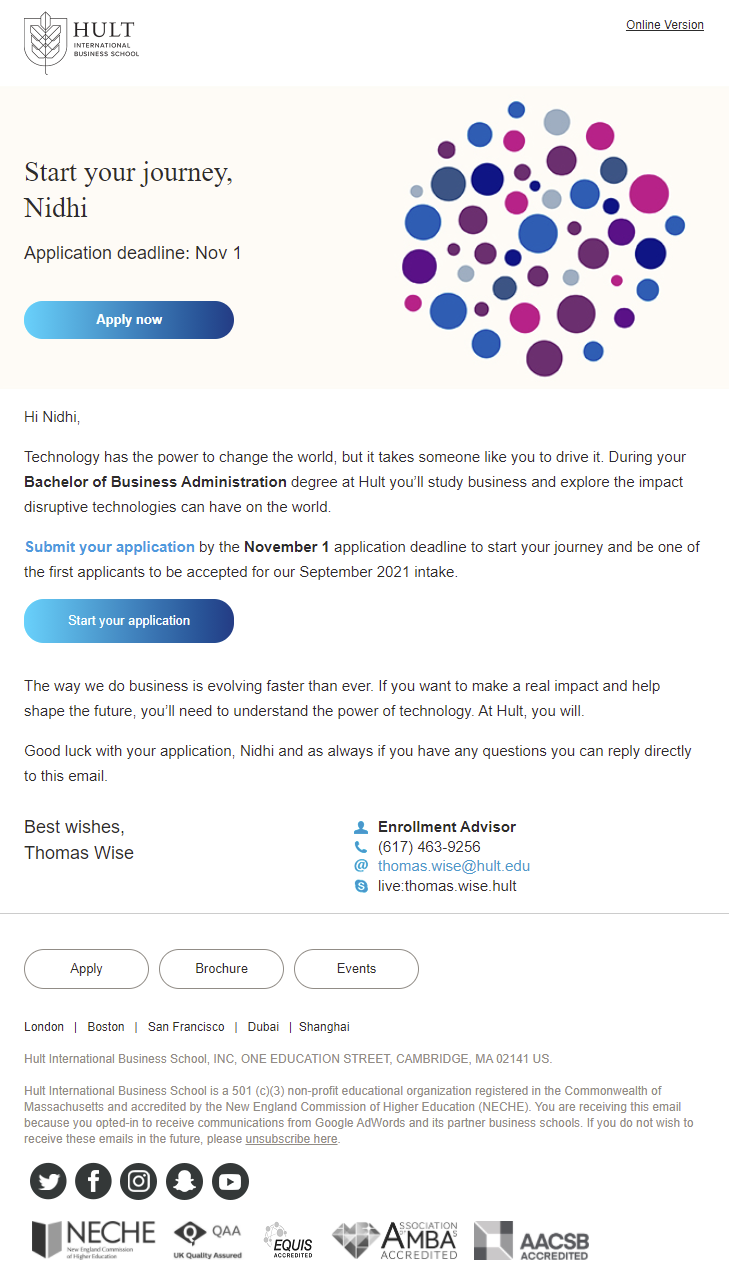
Email template #4: Follow-up with prospective students
While asking students to complete their applications, make sure you mention any soon-to-pass deadlines.
Subject line – How we may help you? Hi [Student Name] , We’re pleased that you’re interested in [Program Name] at [College Name] . You’ve made the right choice as our graduates often secure fulfilling career at companies such as [Placement Companies] . I would like to inform you that the deadline to apply for [Program Name] is on [Date] . Please complete your application, so that you don’t miss the chance of getting trained from one of the world’s best faculties. [Button – resume application] I know the college application process can be daunting. I’m available to guide you through the application process — from writing an essay, applying for scholarships, or preparing for an admissions interview — or whatever you need. If you have any questions, please feel free to drop me a line! Best Regards, [Your Name] [Designation] [College Name] [Phone Number] [Email ID]
Email templates to invite applications
If you want to solicit applications from high school seniors, try using the following template (inspired by Arizona State University).
Email template #5: Email high school seniors
Subject line – It’s officially summer! Hi [Student Name] , You’re about to start what will likely be one of the most memorable times of your life – senior year. While you must have a lot of things on your mind already, now is the time to start planning for college and learning more about [College Name] . Here are some items you can check off your list: >> Get ready to apply: Review our application requirements to make sure you’re on track before we open the application period in [Date] . >> Plan your campus visit: Mark your calendar to explore the campus, facilities, meet the faculties, and more. Get answers to all your questions about majors, financial aid, housing, and more. >> Register for our summer camps: We invite you to join other high school students at [College Name] summer camps from [Date] to [Date] . Improve your skills and challenge yourself as you learn more about how to be a strong college applicant. See you soon at [College Name] ! [Your Name] [Designation] [College Name] [Phone Number] [Email ID]
Student engagement email samples
Admission email template #6: encourage students to explore your courses.
There may be instances when students drop off while applying and don’t mention which courses interest them. You’ll want to encourage students to explore your programs in more detail. Make sure to include links to relevant landing pages (as opposed to your homepage).
Subject line – Explore the courses we offer Hi [Student Name] , We know you’re interested [College Name] , but you haven’t indicated what type of education you’d like to pursue. That’s okay. We thought it might be helpful to show you where you can learn all that we have to offer via our website: [Create links to pages about your programs, campus culture, arts, sports and recreational offerings, or anything you believe will help enlighten the prospect.] • [Link/label] • [Link/label] • [Link/label] Please get back to me if I can answer any questions for you regarding the curriculum and programs offer at [College Name] ! [Your Name] [Designation] [College Name] [Phone Number] [Email ID]
Here’s an example of student engagement email from the University of Washington.
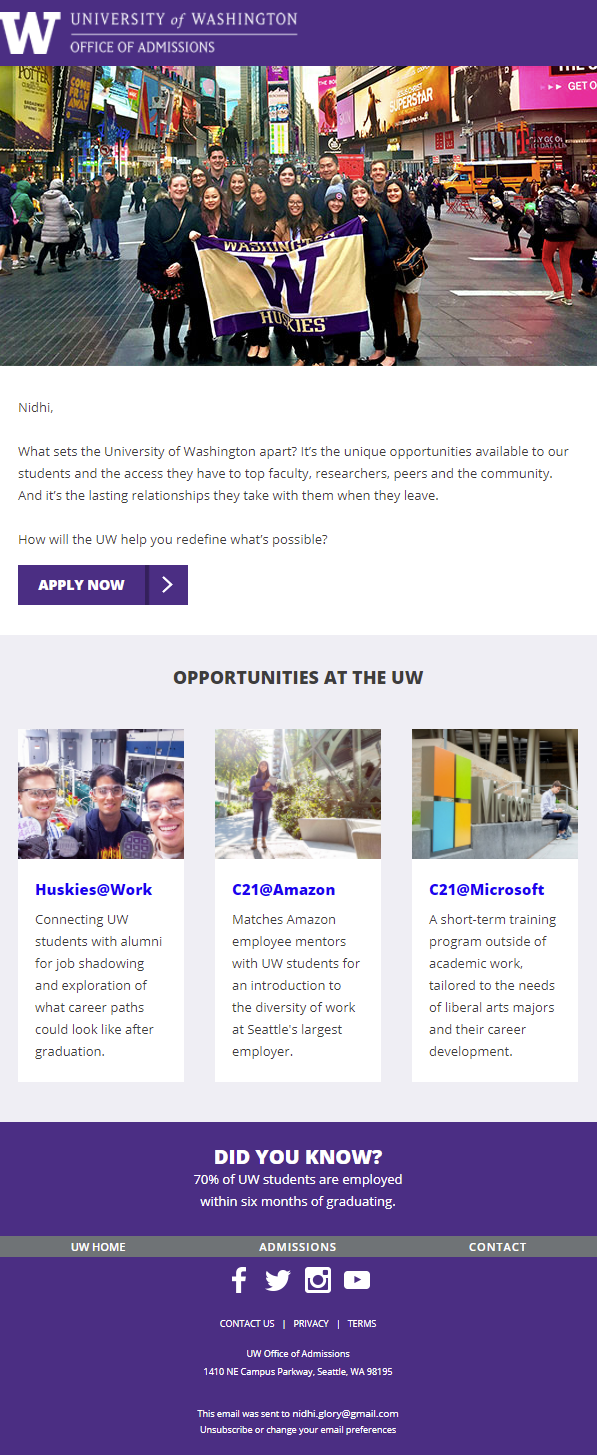
Admission email template #7: Invite students to a campus tour
If you offer campus tours and host open houses, you can use the following email template to invite prospective students. Make sure to mention the benefits they can get through the session, such as one-on-one interaction with faculties and students, on-campus, and off-campus activities.
Subject line – You’re invited to tour our campus Hi [Student Name] , We are hosting a campus tour to help you get to know us better. During your tour, you’ll learn all about the amenities our school offers and how we support your education. Plus, you’ll be able to meet some of our students and faculty members and ask them anything you’d like. We’ve scheduled the event for [Date] . The capacity is limited, so be sure to register now. [Button – Register Now] See you on campus! Best wishes, [Your Name] [Designation] [College Name] [Phone Number] [Email ID]
Email template #8: Invitation for a virtual campus tour
Subject line – You’re invited to tour our campus online Hi [Student Name] , If it’s convenient for you to tour our school online, you’ll be happy to know we’re hosting a virtual campus tour on [Date and Time] . You’ll learn all about our campus, facilities, departments, and infrastructure. Also, you can chat with our faculties and students and ask them anything you’d like.. [Button – Register] See you soon! Best wishes, [Your Name] [Designation] [College Name] [Phone Number] [Email ID]
Email template #9: Explain the admission process with a web session
Subject line – Join us for a virtual information session regarding admissions Hi [Student Name] , We understand that applying to a graduate program can be stressful. Breath easy: we’ve organized a virtual information session to help you get through the application process. [Event details] We hope you’ll join us to learn more about the admissions process and application requirements. [College Name] has a rolling admissions process, so we’re still accepting application. The application platform will close on [Date] . After you register for the event, you will receive an email asking you to confirm. You’ll also be able to submit questions and topics you’d like to hear discussed during the virtual information session. Register for the event now: [Link] Should you have additional questions, please reach out to our graduate admissions team at [admission officer’s email] . Best regards, [Your Name] [Designation] [College Name] [Phone Number] [Email ID]
This email template is inspired by Boston University’s admission email.
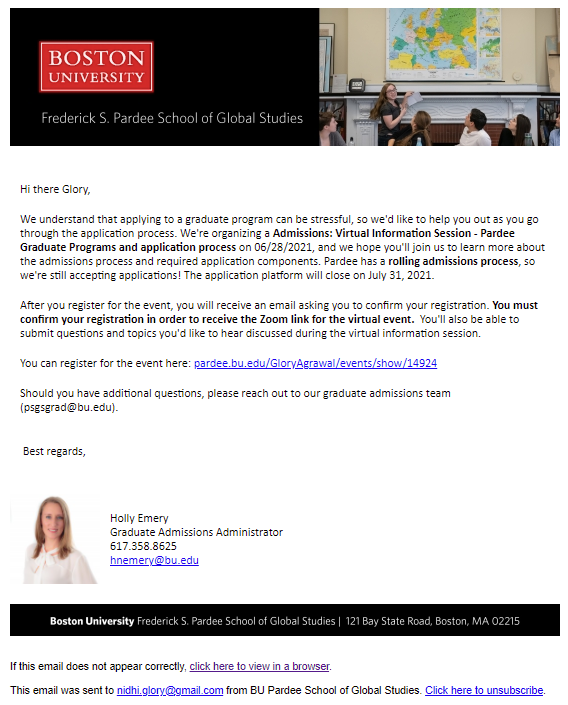
Email template #10: Invite students to informative webinars
Subject line – Masterclass on [Topic] starting on [Date] Hi [Student Name], At [College Name] , we look for students with visionary spirit, which is why we want to invite you to join a webinar on [Topic]. In this masterclass, we’ll explore: [Point 1] [Point 2] [Point 3] Sounds interesting? We’d love to have you join us. You’ll get a sense of what it’s like to study at [College Name] . [Button – Register Now] Best wishes, [Your Name] [Designation] [College Name] [Phone Number] [Email ID]
Email template #11: Invitate students to student panel
Use this template when you’re hosting events such as student panel discussions to engage with prospective students.
Subject line – [Program name] at [College Name] Hi [Student Name] , I want to invite you to the student panel we are hosting on [Date] , at [College Name] ! This event will feature our current students, so you’ll have the opportunity to hear all about their experiences here. In the panel, we have [Details about the speakers] . All the students are in their second or third year and have been heavily involved in all sorts of clubs/societies since they started at our institution: everything from sports, finance, investing, society, and so on. You’re sure to enjoy the event. Register here: [Link] See you there! [Your Name] [Designation] [College Name] [Phone Number] [Email ID]
Scholarship and financial aid communications
According to educationdata.org , 86.4% of first-time, first-year undergraduate students receive financial aid in some form. If your college offers financial programs and processes, make sure you clearly convey:
- The process to apply for financial aid
- The part of fees that will be covered/not covered through the grant
- The programs that are covered under financial grants
- Any other important information that the student must know
You might also want to include information about grants you’ve issued in the past to demonstrate to your students how robust your financial aid programs are.
Email template #12: Offer assistance for financial aid/student loans
Subject line – Do you need financial assistance? Dear [Student Name] , We’re glad to have received your application for [Program Name] . For your information, we offer student loans in case you’re going to need financial assistance. The process is fairly simple. All you have to do is check eligibility and apply online. Our admission counselor will reach out to you and assist you with available options and deliver all the information you need. [Button – apply for student loan] [Student Name] , feel free call or respond if you have any questions. Best wishes, [Your Name] [Designation] [College Name] [Phone Number] [Email ID]
Email template #13: Respond to a student who has applied for financial aid
Subject line – Important update on your financial assistance application Hi [Student Name], We’re glad to have received your application. Please visit the following link to learn more about your eligibility for financial aid. [Link] If you fulfill the eligibility criteria, our financial counselor will call you soon for further assistance. Be assured, we aim to help as many students as possible with grants. If you have any questions, feel free to call me. Best wishes, [Your Name] [Designation] [College Name] [Phone Number] [Email ID]
Email template #14: Invite students to apply for scholarships
Apart from grants, if your institution offers scholarships, you can use the following sample email.
Subject Line – You’re just a click away from our global scholarship program Hi [Student Name] , The best way to predict the future is to create it. Did you know [College Name] offers scholarships to select candidates who demonstrate the most potential to make a lasting impact on the world? Apply before the deadline [Date] to be considered for our [Session] or [Session] start term. [Button – Apply now] Best wishes, [Your Name] [Designation] [College Name] [Phone Number] [Email ID]
Email template #15: Invite students for online courses
Subject line – Join us for online classes Hi [Student Name] , We’re pleased to invite you to enroll in our upcoming online courses this summer. [Course Name 1] Details Link to enroll [Course Name 2] Details Link to enroll [Course Name 3] Details Link to enroll Students from across the globe have completed over 30,000 hours of learning with us en route to successful careers. Enroll in the online courses that interest you now! Best wishes, [Your Name] [Designation] [College Name] [Phone Number] [Email ID]
Tips for higher education email marketing
Here are some tips to make your email campaigns more effective.
- Include a call-to-action (CTA) If you can use a CTA button, it will encourage students to complete a relevant action. Make the button prominent and surround it with white space. Also, try to offer only one CTA per email.
- Segregate your list Base emails on courses of interest, preferred campus, etc. and send emails accordingly to prospective students.
- Personalize your email Personalize the subject line and the email content by using the student’s name. You might also include the specific program the student’s expressed interest in. Personalized emails can increase open rates by over 300% .
- Use images Wherever relevant, use images to make the emails more attractive.
- Track email performance Keep a tab on the email open rates, clicks, and conversions. Email metrics are important to track so that you can make ongoing improvements to your subject lines and messaging.
- Use mobile-friendly email templates Today, students use mobile devices more than laptops. Therefore, make sure the email templates you use are mobile-friendly.
- Have the essential message ready to go Use email templates to save time and avoid missing important information . (You’re welcome.)
LeadSquared is your all-in-one email platform for efficiency.
To make the most of your email campaign performance, use LeadSquared CRM for higher education . With LeadSquared, you can create mobile-responsive emails from ready-to-use templates, track emails and the student journey – from inquiry to enrollment.
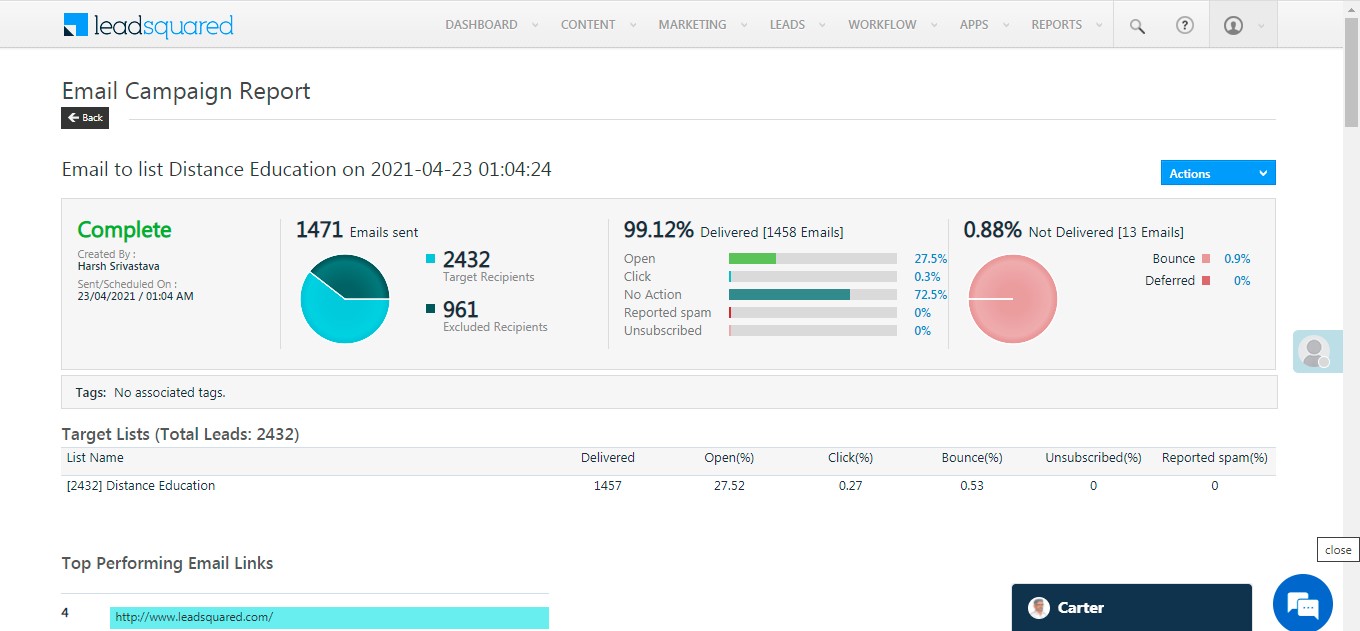
Want to see for yourself?
More in this series:
15 Customer Service Email Templates
Go beyond generic templates. Segment your email list by factors like program interest, application stage, or previous interactions. Craft personalized messages that address the specific needs and concerns of each student segment. This personalization demonstrates genuine interest and increases the chance of engagement.
Craft clear and compelling CTAs. Instead of generic “Learn More” buttons, consider using action-oriented language that aligns with the email’s purpose. For example, “Download our program brochure” or “Schedule a virtual campus tour” provide specific next steps that encourage students to take the desired action.
Implement A/B testing to compare different versions of your emails. Test variations in subject lines, email content, CTAs, and even sending times. Analyze the results to identify the elements that resonate best with prospective students. Continuously refine your email strategy based on data to maximize open rates, click-through rates, and ultimately, applications from qualified students.

Nidhi is a content writer/editor at LeadSquared. She works closely with sales professionals and senior management to bring their outlook into her write-ups. Connect with her on LinkedIn or write to her at [email protected].
Table of Contents
- Share on Facebook
- Share on Twitter
- Share on WhatsApp
- Share on LinkedIn
Want to see LeadSquared in action?
- Customer Portal
- Performance Management
- Dev Platform LAPPS
- Help Portal
- Pricing SALES
- Pricing MARKETING
- Education CRM
- Healthcare CRM
- Insurance CRM
- Banking CRM
- Real Estate
- Marketplace CRM
- Manufacturing CRM
- What is CRM
- What is lead management
- What is vendor management
- What is sales management
- Case Studies
- Guides & Blogs
- Compare CRM
- CRM Glossary
- Sales Glossary
- Media & News
GET IN TOUCH
(+1) 732-385-3546 (US)
080-46971075 (India Sales)
080-46801265 (India Support)
62-87750-350-446 (ID)
- Legal & Compliance

Let us be your fairy godmother!
Leadsquared can make these results yours (it's just like magic) .

How To Write An Email To A College Admissions Office
When there is a reason to write to a prospective college admissions office, you will want to make sure your writing does three things:
- Clearly states what prompted the email,
- Represents you with the image you are striving for at that school, and
- Helps you stand out as a memorable and qualified applicant.
Above all, and as with any aspect of the college admissions process, the priority for emailing an admissions officer should always be respectfulness and professionalism.
So, how do you accomplish all that?
Composing an email to a stranger- especially one you want to impress- can feel like trying to walk up an unfamiliar flight of stairs in the dark. It’s a known physical experience, but it feels scary, as though any small, wrong move could lead to a painful faceplant.
This article will turn the light on for you and hold your hand so you don’t slip- because emailing is an important tool to be able to use as part of your college admissions process.
While there are many helpful and worthwhile ways to interact with any admissions office, email is one of the best.
It’s great because it allows people to respond when they have time, it allows you to reach out no matter how far away you are (or what time zone you live in), and it gives you the opportunity to plan and polish what you’re going to say (rather than being under pressure to respond immediately and think on your feet).
Please don’t feel bad if this is not in your comfort zone.
Gone are the days when people corresponded through handwritten letters, so writing to people is no longer necessarily a culturally developed art form.
But even if we were wizards who communicated via owls, you’d still need to be able to design the message yourself.
So we’re going to show you how.
Keep reading to discover:
- When to send an email to create the biggest impact in your college admissions process
- Who to send your email to in the college admissions office
- How to compose the best possible email
- Overall tips to remember
- A couple of example emails of what to send to a college admissions officer
You’ve taken a fantastic first step in being here and proactively learning all you can about the ins and outs of the admissions process . Now, let’s figure out this aspect of it, together.
When To Send An Email To A College Admissions Office
There are three excellent reasons for reaching out in an email:
- Requesting more information about the college
- Introducing yourself to the admissions committee
- Following-up to say thank you after having met with them in person or through a digital interaction
Request Info
Always start with your own research about the school so you’re not asking any questions that have easy-to-find answers.
Don’t let your first impression be them wondering if you’re lazy or incompetent by inquiring about info that is on the college’s homepage or easily googled. You don’t want them to feel like you’re wasting their time.
You also don’t want them to question if you’re just pretending to be interested.
Ask good, genuine questions and engage in a sincere way.
When there is a program or professor you’d like to get more info from or connect with, reaching out to the college’s admissions office is a great way to make it happen.
If you’d like to attend a class or particular event, the admissions office is an excellent resource.
Introduce yourself
Whether you already have a personal connection to the school or not, it’s always a good idea to officially and pointedly approach the admissions office.
Let them know who you are, or remind them of who you are, and that you are honestly interested in this school.
Ever heard of demonstrated interest ?
It is a practice that many schools have adopted, where they keep track of how much interest potential students demonstrate (and in what ways) that they want to attend said college.
This phenomenon of ranking demonstrated interest has become increasingly important in the last decade, so it is important to be aware of it and use it to your advantage.
Thank you and follow-up questions
An email is an underutilized tool for solidifying a good second impression.
According to Rachel Toor, a former admissions officer at Duke, “80 percent of students who apply could do the work if they were admitted,” so the choice of who to admit often comes down to officers and faculty arguing the case for their favorite candidates to the rest of the admissions committee.
Use opportunities like emailing to create a fan who will fight for your entrance when the time comes.
Not many people take the time or put forth the effort to say thank you- so being one of the few that does can go a long way.
This contact method could be effectively used after a college fair, a virtual or in-person tour, an information session, or an interview.
The college admissions officer’s job is lots of work and they get nervous too. Let them know what you enjoyed, what was useful to you, or what you were left wondering.
Your follow-up questions can be a polite indication of important information they may have left off their presentation so they can add it in the next time.
Also, it’s perfectly natural to think of questions or comments after-the-fact, so don’t hesitate to continue the conversation with them via email if it warrants further discussion.
How To Figure Out Who To Send Your Email To
If you haven’t already gotten an email from the college’s admissions office or joined their social media (both of which you should do - it’s an easy way to demonstrate your interest in the school and it’ll ensure you have all the info they’re sharing), it’s still fairly simple to find their email address with a little help from Google.
Each college has a dedicated regional admissions officer assigned to your area.
Depending on the school, there might be one officer for your whole state, one to cover your county, or one that specifically covers your high school.
Under “contact” or “connect” on a school’s website there is often a “meet your counselor” feature that lets you search out your territory to see who is assigned to you. Sometimes it will even provide you with biographical info, but at the very least you will get contact information.
How To Compose An Email To A College Admissions Officer
First of all, let’s go ahead and acknowledge that it is natural to be nervous.
But don’t let it get you to the point of being too intimidated to reach out.
College admissions officers are humans too and it is their job- their goal, in fact- to be there specifically to help you find your best-fit college and get admitted .
So if you’re feeling apprehensive, just think of emailing as doing them a favor.
They have all this information they want to give out, all of this help they want to offer you- but you need to ask for it so they know what to tell you about.
The Greeting
The greeting should be respectful and follow their lead.
Address the person in the same manner that they sign off on their emails.
The correct information is easily found on the admissions website:
- The Contact Name - Triple check, or copy and paste, to be sure spelling is correct. Most people get very offended if their name is spelled wrong- whether it’s a difficult name to spell or not.
- The Titles - Formal is best. Do not use their first name alone unless you truly feel you are on a first-name basis with them. Never use “Mrs.” unless that is how they introduce themselves; best not to assume. Stick to Mr. and Ms., while also being attentive to the fact that they might be a “Dr.”- in which case, address them as such.
- The Pronouns - In most cases, people will indicate their pronouns so be sure to pay attention and keep an eye out for that. If they are not indicated, don’t guess. Use a respectful gender-neutral option or re-write your email to not require pronouns.
This is an important factor in establishing your credibility and professionalism.
Your tone should be:
- Formal, not casual. Don’t abbreviate or speak as if this was to a friend or a kid.
- Friendly, not desperate. Keep your writing focused on the school more than overtly promoting yourself, if possible. Use the word “you” as much as “I” throughout the body of your email; people are more receptive to what you’re saying if it feels like you’re not just focused on yourself.
- Trustworthy, not pretentious. (This is not the place to show off the words you’ve been studying as part of your ACT and SAT testing preparation .)
The formatting and grammar
- Be accurate. Follow the rules of punctuation and capitalization, check your spelling. Give them evidence you’re a good fit in their academic institution.
- Be concise. They’re busy so get right to the point. Don’t use filler words or sentences that waste time and obscure the point of your email.
- Be clear. Use new paragraphs they can read quickly and easily. Re-read what you wrote to make sure that what you’re asking is easily understood.
The Best College Questions
Make your email effective by asking questions that matter, questions that give both you and the admissions office the information needed for determining a good match.
After all, that is the key point of all interactions with the colleges you are researching.
To help you make the most of your email opportunities, we have compiled a list of the best questions to ask college admissions officers .
If you have any questions about the overall process itself, or you are comparing different schools’ answers, feel free to send us emails too. We are here to help you all the way.
We can assist with polishing your list of questions and advise about correspondence.
We’d love to help you sort through the information coming back to you so that you can select the best possible college for you .
The Signature Sign-Off
End your email briefly, politely, and be sure to remind them of who you are.
- Sign off with a simple “Sincerely,” “Respectfully,” or “Best regards,” or similar short term.
- Always use both your first and last name so there is no doubt about who sent the email.
- Include your contact information below your name so they can easily locate it.
Overall Tips For Communicating With Any College Admissions Office
- Be true to yourself. The information they have will be used to determine if you fit there, so be honest and don’t misrepresent who you are and what you’re interested in. It's helpful to both of you.
- Be patient in requesting a response. Keep in mind that they receive hundreds of emails daily. If it's time-sensitive information you need, allow them whatever time you can for their answer before sending a follow-up email and/or phone call to get urgent information. Otherwise, when you have the time to wait, do so - but don’t forget about it. Emails can end up in junk mail so it's okay to resend the email with a brief and polite note stating that you understand how busy they are, and in case they didn’t receive your email you are resending it. Additionally, sending it as a thread connected to the original email helps the recipient determine what questions you are referring to and doesn’t add to their list of new emails to answer.
- Be efficient. Briefly say what you need to say and send it promptly.
- Edit and proof. This is key to looking and sounding professional, as well as showing them that you are a qualified college-bound student.
- Try to avoid template email sending. Having one email that you send to every college will feel sterile to the reader and it can be easy to forget to replace the name of one school with the name of another, which would really undermine the sincerity you want to display.
- Make sure your social media accounts are appropriate-looking. Remember, once they get your email or have your name on a list somewhere, they will be looking you up online. Make sure that what they’ll see is what you want to be showing.
- Respond as quickly as you would want to be responded to. If they reach out to you or respond to you with questions of their own, be sure to respond promptly- preferably that day. Don’t leave them hanging. Even if they don’t ask a question, it is usually appropriate to at least respond with a simple “thank you” so they know you received their email.
Now that we’ve parsed the finer points of email etiquette and things to remember when communicating with any college admissions office, let’s put these principles into action and look at some example emails.
Sample College Admissions Email #1
Dear Ms. Fitzsimmons,
Thank you for taking the time to speak at the “College Bound Consortium” held at American High. I wanted to introduce myself and ask you some questions about Cool College.
My name is Sammy Successful. I’m a junior at American High School here in Awesometown, MO, and currently, my primary interests are entrepreneurship and playing soccer for your successful team. Knowing the large time commitment of both of those programs, do you believe it would be possible for me to complete a business degree in four years if I’m also lucky enough to make the soccer team?
Additionally, since Awesometown is not close enough to drive to Cool College, I won’t be able to see any games this year. Would you be able to connect me with some of your current players so I could get a better understanding of what your team is like?
I am excited to learn more about Cool College and to speak with someone one-on-one about the specifics of your programs.
Best regards,
Sammy Successful
123.456.7890
Sample College Admissions Email #2
Dear Dr. Carter,
It was a pleasure meeting you today and I appreciated how you took the time to speak individually with each student at the College Fair.
After talking with you and reviewing Unique University’s information, I have some additional questions.
As captain of my school’s debate team, I hope to continue competing in college. In my research, I noticed that you have an active, award-winning debate program. Would you be able to tell me what events they focus on, how big their team usually is, and the process for selecting next year’s team?
Also, I took home your packet about the biology department and was impressed with the system you have in place for advising students about med school after college. My current goal is to attend veterinary school after college, but I wasn’t able to find any further specifics about that. Can you give me more information about any possible animal-related opportunities your school might offer and whether your advising program covers veterinary medicine?
I look forward to learning more about Unique University and how I might fit in there.
Now that you have all the tips and information, you’re ready to craft your own emails that represent who you are and connect you with the school of your dreams.
Of course, none of this is going to be possible if you don’t know what the school of your dreams is.
We can help you there, too.
Do a College Comparison Data Dive with us to explore the essential information about schools you have your eye on and also discover hidden gem programs and colleges that you hadn’t even considered before, but might just be the best pathway to your life and career goals.

eCampus College Tips & News

A Guide to Going on College Tours
What is a college tour.
A college or campus tour typically involves prospective students, their parents/family members, and other visitors taking a tour of a college or university’s campus to learn more about student life and culture, academic programs offered by the institution, and their own individual interests. College tours play an integral role in assisting with the college selection process. They’re a great way to narrow down the list of schools you’d like to apply to and/or compare and contrast the differences between your top choices. Many colleges are similar when it comes to academic offerings and educational quality/prestige, so the differences in an atmosphere may be the deciding factor for your eventual decision.
Are College Tours Worth It?
Yes, college tours are absolutely worth it! College tours give you a chance to see the school’s campus, ask questions about a variety of topics you’re interested in learning about, and to get a glimpse into what your experience would be like if you attended the institution. If there’s anything you’d like to know more about, be sure to leave no stone unturned by asking questions and venturing off to areas you’d like to experience first-hand.
How to Schedule/Sign Up College Campus Tours
Scheduling a college campus tour is a fairly straightforward process. You can search online for the school’s name, followed by “Campus Tour” and you’ll usually be able to find a page on the school’s website to register for a tour online. Additionally, most schools have admissions offices and visitor’s centers where you can book a college tour by email, phone, or in person. Many schools also allow you to have a self-guided tour, where you can explore the campus at your own pace with a map of noteworthy locations to visit or even participate in a virtual tour online. Be sure to schedule your visit in advance so you’re able to book the optimal time and not miss out on any potential tours.
When should you start college tours?
You should start taking college tours prior to or during your final year of high school. This could be after you’ve already been accepted to the school or before you’ve applied to figure out whether you’re interested in doing so. College tours are also very helpful for students that are transferring from another school or for a nontraditional student, starting their higher education journey at a later point in their life.
How to Plan for a College Tour Trip
In order to plan for your college tour trip, you should first do some research on the school that you’re visiting and the surrounding area. Spend some time learning about hot spots for students and other activities that are of interest to you, like clubs or organizations on campus. Also explore feedback on the main benefits/advantages of the school and the most frequently reported complaints/drawbacks.
What to Wear on a College Tour
This is a tour, which means you’ll likely be doing a ton of walking, a lot of which will be outdoors. Keep this in mind when you get dressed for your College tour and consider wearing cool, breathable clothing if it’s hot outside or warm, insulated clothing if it’s cold outside. It’s also highly recommended to wear shoes that are comfortable to walk lengthy distances in.
How long do college tours take?
College tours typically take 4-5 hours for a first visit, but that can vary based on your level of interest and involvement. Be sure to make the most of your time by learning and experiencing as much as you can during the visit.
What questions should I ask on a college tour?
It’s important to ask questions related to individual areas of interest, academics, campus life, the student body, and career services at the school. If you’re on a guided tour, you’ll have a tour guide along with your group that will gladly answer any questions that you may have. Here’s an article from The Princeton Review with a great list of 60 questions to ask on your college tour: Article .
Do College Tour Guides Get Paid?
In case you were curious: yes, college tour guides are usually paid. According to Zippia, the average wages of a college tour guide are around $13/hour ( source ). Many college tour guides are active students at the institution, so if you’re ever looking for a job during your college experience, this is a viable option.
Do college tours cost money?
College tours are typically free and it’s not customary to tip your guide at the conclusion of the tour. However, you do have to set a budget for any traveling and lodging required to visit. Many wealth advisors suggest setting aside at least $1,000 for campus visits ( source ).
All in all, college tours are an important part in the school selection process. Whether you’re a high school student, transfer student, or a nontraditional student, you’ll be able to find immense value in seeing a school’s campus for yourself, experiencing the atmosphere and area’s offerings, and being able to ask questions to people who attend. If you’re considering attending college in the near future, it’s heavily recommended to attend some college tours yourself and we hope you can use this guide to make the most of your visit.
If you liked this post, subscribe to our weekly blog! Be sure to connect with us @ecampusdotcom on Twitter , Instagram , & Facebook for more resources, tips, and some great giveaways! And when it’s time for textbooks, eCampus.com has you covered for all your course material needs at savings up to 90%!
Need textbooks? Shop Now
Your browser is unsupported
We recommend using the latest version of IE11, Edge, Chrome, Firefox or Safari.
College of Pharmacy - Chicago | Rockford
Our programs heading link copy link, start your career in pharmacy, bachelor of science in pharmaceutical sciences.
- BSPS Pathway This four-year undergraduate degree includes PharmD program prerequisite courses as well as PharmD courses.
- BS/PharmD Pathway Students can complete the BSPS and PharmD Program in seven years instead of the traditional eight, with the last year of the BS overlapping with the first year of the PharmD program.
Flexible, online options for healthcare professionals
Online programs.
- MS in Comparative Effectiveness Research Comparative Effectiveness Research is the “conduct and synthesis of research comparing the benefits and harms of different interventions and strategies to prevent, diagnose, treat and monitor health conditions in real-world settings.
- Pharmacoepidemiology Certificate Designed for working professionals who are looking to advance their career in either pharmacoepidemiology or pharmacovigilance. The program integrates material from biostatistics, epidemiology, pharmacy, and policy and regulatory science.
Become a Pharmacist at UIC
Learn more and apply to the pharmd program.
- Connect with Us Request info, attend an info session, learn more about the variety of program concentrations
- Learn More Visit the UIC PharmD program page for general info, FAQs, and more
Leading the field in research
Earn a phd in pharmacy or pharmaceutical sciences.
- PhD in Pharmacy (Systems, Outcomes & Policy) The PhD in Pharmacy combines statistics and research design with theoretical frameworks from decision and information sciences, economics, psychology, epidemiology, communication, public health, and education.
- PhD in Pharmaceutical Sciences The PhD in Pharmaceutical Sciences focuses on the areas of discovery, development and formulation of biologically active agents for therapeutic applications.
Apply to be a resident or fellow at UIC
Residency and fellowships.
- PGY1, PGY1+2, PGY2 Residencies and Fellowships Home to one of the largest pharmacy programs in the nation, UIC offers a wide variety of residency and fellowship options for pharmacists
- Residency Annual Report Download a comprehensive summary and guide to all the residency programs at UIC Pharmacy
Points of Pride Heading link Copy link
#1 School of Pharmacy in Illinois, according to US News & World Report
# 7 total research grant funding according to the American Association of Colleges of Pharmacy (AACP)
1859 Year the college was founded, one of the oldest pharmacy schools in the country

Become a Pharmacist Heading link Copy link
- Check icon Apply Now
- Calendar icon Attend a PharmD Info Session
- Flag icon Deadlines
- About the PharmD Program
News Heading link Copy link
Events heading link copy link, uic pharmacy at aacp annual meeting, atkins garden walk & norman farnsworth lecture, white coat ceremony | class of 2028, 165th anniversary of the uic college of pharmacy, one college, two campuses, unlimited opportunities heading link copy link.
- Chicago Campus
- Rockford Campus
- Learn more about the One College, Two Campus model
- Maps and Directions
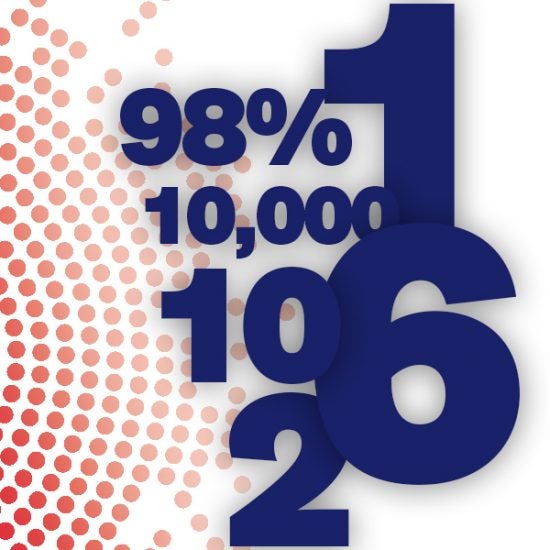
By The Numbers Heading link Copy link
When you choose UIC College of Pharmacy, you choose a great education, world-class faculty, cutting-edge research, and a commitment to service.
Visit our “By The Numbers” page to get an overview on what we offer, including facts and figures that all add up to one thing: an amazing education at a top institution.
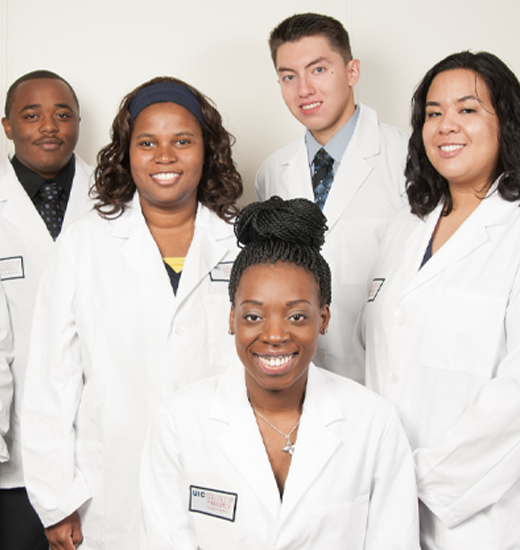
Diversity, Equity and Inclusion Heading link Copy link
We strive to be a community where differences are embraced, that emphasizes inclusion and recognizes diversity as a strength, and where everyone works together to be the global leader in innovative pharmacy education, research, and practice to improve human health.
- Create an email message
- Suggested recipients
- Use @mentions
- Create a signature
- Add attachments
- Check spelling
- Add a reaction
- Out of office replies
- Delay or schedule
- Recall a message
- Automatic forwarding
- Read receipt
- Save a file or draft
- Manual sync
- Create a folder
- Search folders
- Use inbox rules
- Conditional formatting
- Use Favorites
- Use dark mode
- Message font size
- Message list view
- Focused Inbox
- View as conversations
- Filter and sort messages
- Number of messages
- Chat with recipients
- Share an email
- Status in Outlook
- Phishing and suspicious behavior
- Blocked senders
- Protected messages
- Open a protected message
- More to explore

Create and add an email signature in Outlook
In Outlook, you can create one or more personalized signatures for your email messages. Your signature can include text, links, pictures, and images (such as your handwritten signature or a logo).
Note: If the steps under this New Outlook tab don't work, you may not be using new Outlook for Windows yet. Select Classic Outlook and follow those steps instead.
Create and add an email signature
On the View tab, select View Settings .
Select Accounts > Signatures .
Select New signature , then give it a distinct name.
In the editing box below the new name, type your signature, then format it with the font, color, and styles to get the appearance you want.
Select Save when you're done.
With your new signature selected from the list above the editing box, go to Select default signatures and choose whether to apply the signature to new messages and to replies and forwards.
Select Save again.
Note: If you have a Microsoft account, and you use Outlook and Outlook on the web or Outlook on the web for business, you need to create a signature in both products.
Create your signature and choose when Outlook adds a signature to your messages
If you want to watch how it's done, you can go directly to the video below .
Open a new email message.

Under Select signature to edit , choose New , and in the New Signature dialog box, type a name for the signature.
Under Edit signature , compose your signature. You can change fonts, font colors, and sizes, as well as text alignment. If you want to create a more robust signature with bullets, tables, or borders, use Word to create and format your signature text, then copy and paste it into the Edit signature box. You can also use a pre-designed template to create your signature. Download the templates in Word, customize with your personal information, and then copy and paste into the Edit signature box.
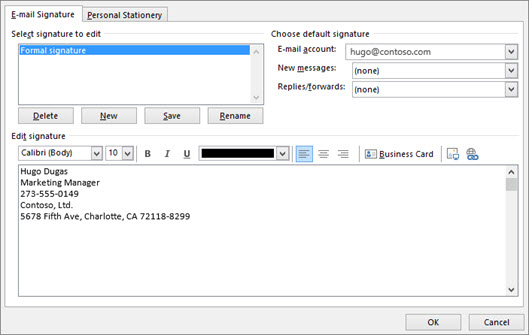
You can add links and images to your email signature, change fonts and colors, and justify the text using the mini formatting bar under Edit signature .
You can also add social media icons and links in your signature or customize one of our pre-designed temlates. For more information, see Create a signature from a template .
To add images to your signature, see Add a logo or image to your signature .
Under Choose default signature , set the following options.
In the E-mail account drop-down box, choose an email account to associate with the signature. You can have different signatures for each email account.
You can have a signature automatically added to all new messages. Go to in the New messages drop-down box and select one of your signatures. If you don't want to automatically add a signature to new messages, choose (none). This option does not add a signature to any messages you reply to or forward.
You can select to have your signature automatically appear in reply and forward messages. In the Replies/forwards drop-down, select one of your signatures. Otherwise, accept the default option of (none).
Choose OK to save your new signature and return to your message. Outlook doesn't add your new signature to the message you opened in Step 1, even if you chose to apply the signature to all new messages. You'll have to add the signature manually to this one message. All future messages will have the signature added automatically. To add the signature manually, select Signature from the Message menu and then pick the signature you just created.
Add a logo or image to your signature
If you have a company logo or an image to add to your signature, use the following steps.
Open a new message and then select Signature > Signatures .
In the Select signature to edit box, choose the signature you want to add a logo or image to.

To resize your image, right-click the image, then choose Picture . Select the Size tab and use the options to resize your image. To keep the image proportions, make sure to keep the Lock aspect ratio checkbox checked.
When you're done, select OK , then select OK again to save the changes to your signature.
Insert a signature manually
If you don't choose to insert a signature for all new messages or replies and forwards, you can still insert a signature manually.
In your email message, on the Message tab, select Signature .
Choose your signature from the fly-out menu that appears. If you have more than one signature, you can select any of the signatures you've created.
See how it's done

Top of page
Note: Outlook on the web is the web version of Outlook for business users with a work or school account.
Automatically add a signature to a message
You can create an email signature that you can add automatically to all outgoing messages or add manually to specific ones.
Select Settings at the top of the page.
Select Mail > Compose and reply .
Under Email signature , type your signature and use the available formatting options to change its appearance.
Select the default signature for new messages and replies.
Manually add your signature to a new message
If you've created a signature but didn't choose to automatically add it to all outgoing messages, you can add it later when you write an email message.
In a new message or reply, type your message.

If you created multiple signatures, choose the signature you want to use for your new message or reply.
When your email message is ready, choose Send .
Note: Outlook.com is the web version of Outlook for users signing in with a personal Microsoft account such as an Outlook.com or Hotmail.com account.
Related articles
Create and add an email signature in Outlook for Mac
Create an email signature from a template

Need more help?
Want more options.
Explore subscription benefits, browse training courses, learn how to secure your device, and more.

Microsoft 365 subscription benefits

Microsoft 365 training

Microsoft security

Accessibility center
Communities help you ask and answer questions, give feedback, and hear from experts with rich knowledge.

Ask the Microsoft Community

Microsoft Tech Community

Windows Insiders
Microsoft 365 Insiders
Find solutions to common problems or get help from a support agent.

Online support
Was this information helpful?
Thank you for your feedback.
- Student Athletes Login
- College Coaches Login
- Club & HS Coaches Login
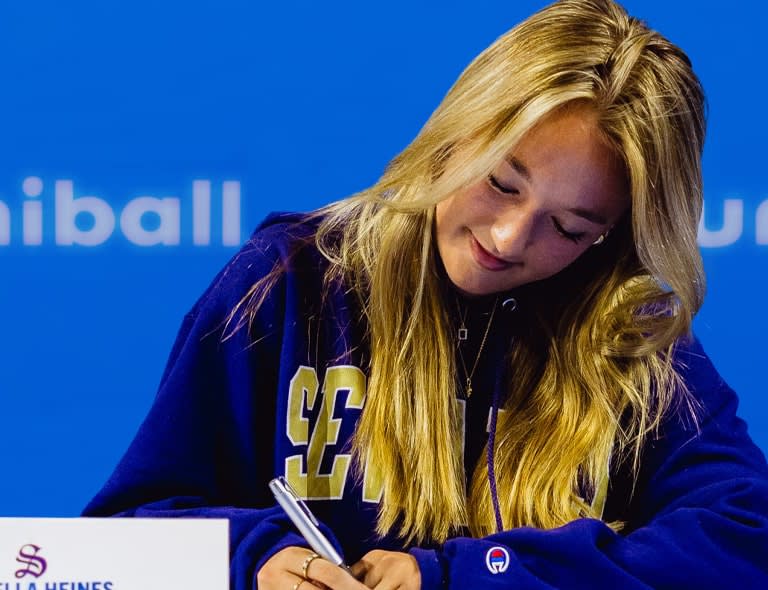
Get Confident. Get Connected. Get Recruited.
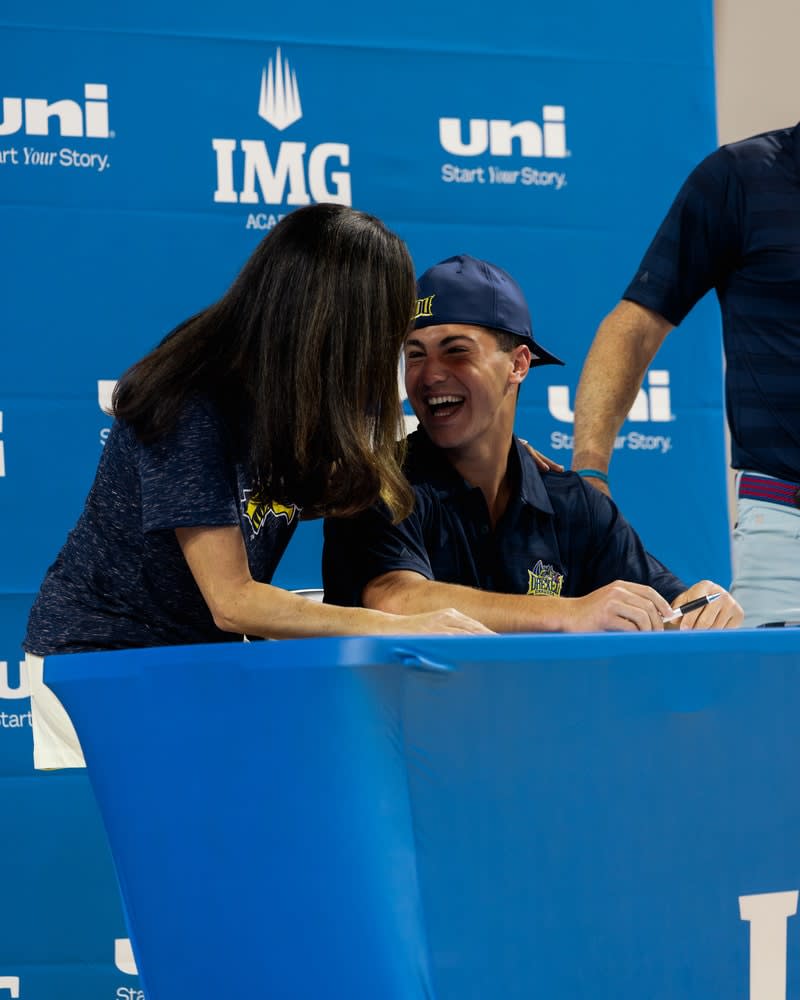
meet our experts
Having a coach takes the guesswork out of your personal development or recruiting goals.

IMG Academy+
Mental Performance & Nutrition
Athletic Recruiting
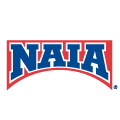
- Athlete Memberships
- Football Camps
- Emailing Coaches
- D1 Colleges

IMAGES
VIDEO
COMMENTS
Then you need to introduce yourself. Write three to four sentences that include the following: your name. where you are from. what grade you are in. that you will be applying to the university. what your primary academic interests are. what day you will be visiting. Follow those sentences with your request.
Our 'Tour Now' section takes the stress out of the college search. In one location, students can explore all 2,500 four-year colleges and universities and 900 community colleges throughout America. Easy-to-use, this platform allows you to filter choices by state, college type, and size, narrowing down the search based on your preferences.
Start planning early. As students get closer to the final year of high school, their schedules are filled trying to balance school and a social life - all while exploring potential college ...
College visits allow you to learn more about a college and allow the college to learn more about you. There can be a lot of build up to a college visit. You are likely feeling excited about touring a new campus and taking another step towards choosing your future college. You might also be feeling anxious about putting your best foot forward.
Also, during a college visit, see if you can get the contact information for the tour guide, often a current student. Many will offer their information in case you have any additional questions. Send a quick "thank you" email when you get home, and include any additional questions you have that you would like answered from the perspective ...
How to Qualify. Earn entries in monthly drawings for $500 and $40,000 scholarships by completing the six qualifying steps on BigFuture. If you don't win, your entry rolls over for the next month. To enter without creating an account, see official rules. View Scholarship Details.
Receiver's Name. Receiver's Job Title. Name of the College. College Address. Subject: Thank You Letter. Dear ABC, I am writing this letter to thank you for the efforts you have made throughout the campus tour. Being a parent I am very much concerned about the college my daughter will be going to.
And you can plan your own informal visit to a college campus. Take these important steps first: Visit the college's admissions website to get details about arranging for an in-person visit. Check with your school counselor to see if any campus tours are scheduled. Set aside time to be on your own. Walk around the public area.
A campus visit is a planned visit to a college or university campus. It involves a guided campus tour, information sessions, and meeting with admissions officers. Visitors can interact with current students, explore the campus community, and see if the college matches their interests and goals. The purpose is to provide firsthand experience and ...
To email a college coach about a visit, you should express your interest in their program and ask if they are available on some upcoming dates to meet with you on campus. Your tone should be polite and respectful, and you should precisely communicate what you would like from the coach, whether that's a one-on-one meeting or a tour of the ...
Get In Touch! If you would like your college or university featured in the series, please fill out our form and one of our producers will contact you shortly. If you are a high school college counselor, please follow this link here for a form specific to you.
Email or Letter to the Admissions Office: Consider sending an email or a letter to the admissions office of the college, expressing your gratitude and praising the tour guide's exceptional service. This not only recognizes the tour guide but also provides valuable feedback for the college.
Things to Do on a Campus Tour. Gather Important Information. Pick up brochures, financial aid forms, and the campus map. Try to sit at the back of a classroom that interests you. If classes aren't in session, you can still stop in a classroom or lecture hall to get a sense of the environment. Meet a professor who teaches a course you're ...
I wanted to take a moment to thank you for the letter of recommendation you provided for my college application. I sincerely appreciate your time and thoughtfulness. I am excited to say that I will be attending the University of Wisconsin! Additionally, I enjoyed my year in your English class, especially several of the books we read and discussed.
Step 2: Call the college or university's admissions office. Don't set up a visit online. Talk to an actual person. Or, if you do set up a visit online, call and make sure the admissions office received your scheduled visit—and that it didn't get lost in cyberspace. Have a detailed conversation about what you'd like to do when you're ...
College Visits Essentials. Embarking on college visits and campus tours marks a significant milestone in the college search process. These experiences offer invaluable opportunities for prospective students to explore potential colleges firsthand, gaining insights into campus life, academics, and extracurricular opportunities. As you begin compiling your college list and narrowing down your ...
LeadSquared is your all-in-one email platform for efficiency. To make the most of your email campaign performance, use LeadSquared CRM for higher education. With LeadSquared, you can create mobile-responsive emails from ready-to-use templates, track emails and the student journey - from inquiry to enrollment.
Here's an ultimate checklist to ensure you cover all bases during your college campus visits. Gather Basic Information: Start your preparation by researching the college's size, academic programs, student-to-faculty ratio, campus setting, and overall culture. This foundational knowledge will help you focus your visit.
I am excited to learn more about Cool College and to speak with someone one-on-one about the specifics of your programs. Best regards, Sammy Successful. 123.456.7890. Sample College Admissions Email #2. Dear Dr. Carter, It was a pleasure meeting you today and I appreciated how you took the time to speak individually with each student at the ...
Additionally, most schools have admissions offices and visitor's centers where you can book a college tour by email, phone, or in person. Many schools also allow you to have a self-guided tour, where you can explore the campus at your own pace with a map of noteworthy locations to visit or even participate in a virtual tour online. Be sure to ...
Requesting a College Visit. Subject Line: Schedule a Visit in April - Taylor Jones, Class of 2026. Hi Coach Stewart, Congratulations on a great season! I saw Tony Bryant was awarded MVP and 1st the banquet. It has been a lot of fun to watch the games online this year! team All-Conference at.
The UIC College of Pharmacy is located on two campuses: Chicago and Rockford. They are about 90 miles apart, but the campuses are constantly connected by the latest distance learning technology and a united mission to produce the next generation of pharmacy leaders. Students in both Chicago and Rockford receive the same education, have active ...
8 a.m. - 5 p.m. 8 a.m. - 6 p.m. 8 a.m. - 5 p.m. 8 a.m. - 4:30 p.m. Students who need sign language interpreters or real time captioning in order to participate should submit a request to: [email protected]. All other requests for accommodations should submit a request to: [email protected].
A Carnegie R1 public research institution, Clemson University is where purpose-driven students, faculty and staff collaborate on projects that impact our state, country and world. Across more than 80 undergraduate majors and 130 graduate degree programs, artists, scientists, authors and engineers begin the work that will define their careers ...
Under Choose default signature, set the following options.. In the E-mail account drop-down box, choose an email account to associate with the signature. You can have different signatures for each email account. You can have a signature automatically added to all new messages. Go to in the New messages drop-down box and select one of your signatures. If you don't want to automatically add a ...
NCSA College Recruiting is a team of more than 1,100 experts—mostly former college athletes and coaches—that helps student-athletes and their families navigate the college recruiting process. We provide a range of services to help student-athletes find the right college program for their academic and athletic goals. Learn more about NCSA.
Adjusted combined federal household income of $125,000 or less. Pursuing an undergraduate degree at a SUNY or CUNY college or university. Enrolled in full-time study (at least 12 credits per term) Complete at least 30 credits per year. Live and work in New York State for a duration equal to the number of years you received the scholarship.
You'll have access to four-year, three-year, or two-year scholarships if you decide to join Army ROTC as a college student. Four-year scholarships are most common for students who are on a five-year college plan, while two-year scholarships are more common for those who attend certain participating two-year community colleges before transferring to a four-year university.